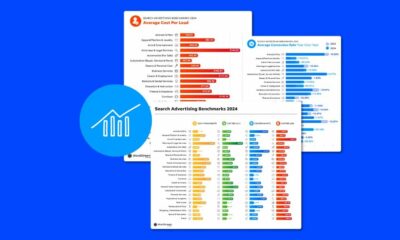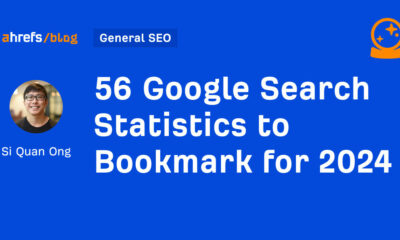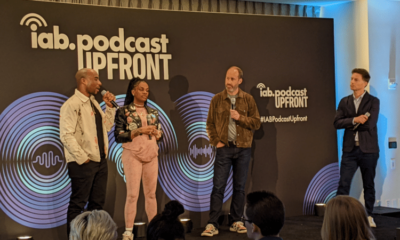SEO
6 Link Building Services That Actually Work (+6 More to Avoid)
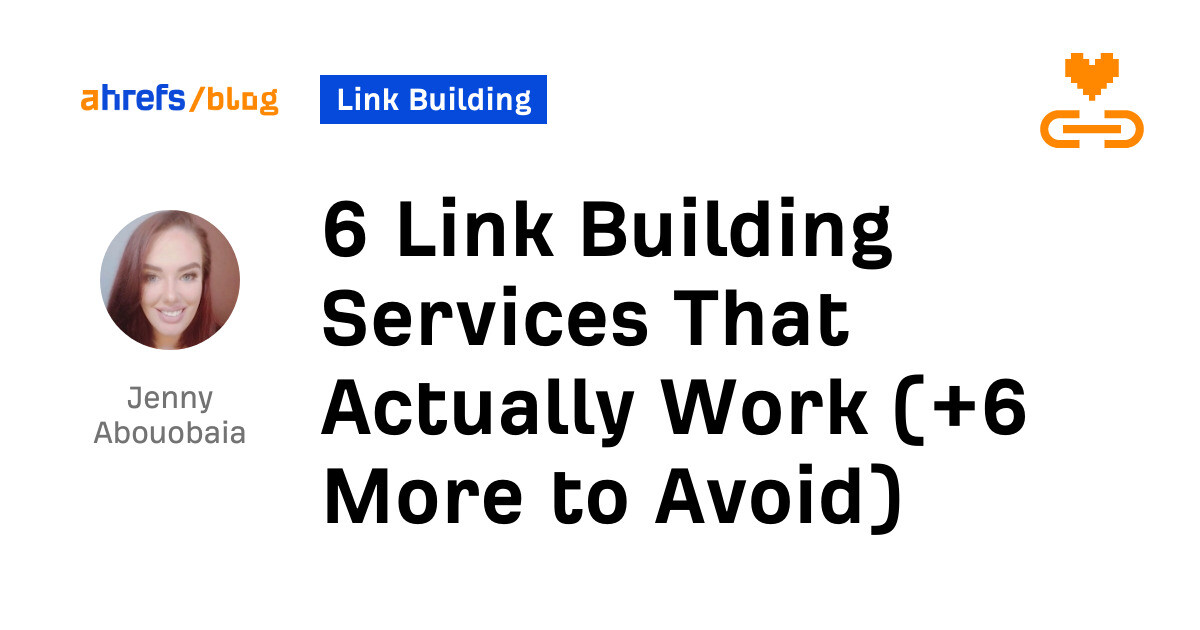
Link building is hard work. Landing top-quality links takes a lot of time. Unless you have a dedicated in-house team of link builders, acquiring the links you need can be difficult, especially if you have more than one site you’re working on.
So if you’re a busy business owner or an SEO with multiple clients, how do you get the links you need while dedicating as little time as possible? By using a link building service.
But knowing the type of link building service you should be looking for can be overwhelming. That’s why we will walk you through the best link building services that work and those you should avoid.
We need to take a look at the link building service providers first, though.
OK, so here’s the thing:
Many link building service providers are beyond sketchy. The majority are selling the digital equivalent of a knock-off Louis Vuitton purse out of the trunk of their virtual car.
Every link building service website, marketplace page, etc., says “manual outreach” and “no PBNs.” But, for the most part, that isn’t the case.
That’s just a quick word of warning for you.
On the bright side, some fantastic link building agencies and freelancers work hard to win top-notch links that you’ll be happy to have on your site and will be proud to show off to your clients.
The tricky part is knowing what to look for to find these gems. Let’s look at some of the things you need to consider.
Reputation
This may seem obvious, but the reputation of an agency or freelancer needs to go beyond the testimonials on their website. Unless they’re reviews from well-known companies or industry professionals, I’ll usually assume these are fake.
Is the company one you’ve heard of before? Are the people behind the company well-known industry professionals?
Before reaching out to them, do some digging. Reading reviews beyond those on social media that anyone can buy is a good place to start.
Checking sites like Glassdoor to see what a company’s staff have to say about it can be a great way to evaluate its reputation. However, you should take these reviews with a grain of salt, as even the best company can have a disgruntled ex-employee.
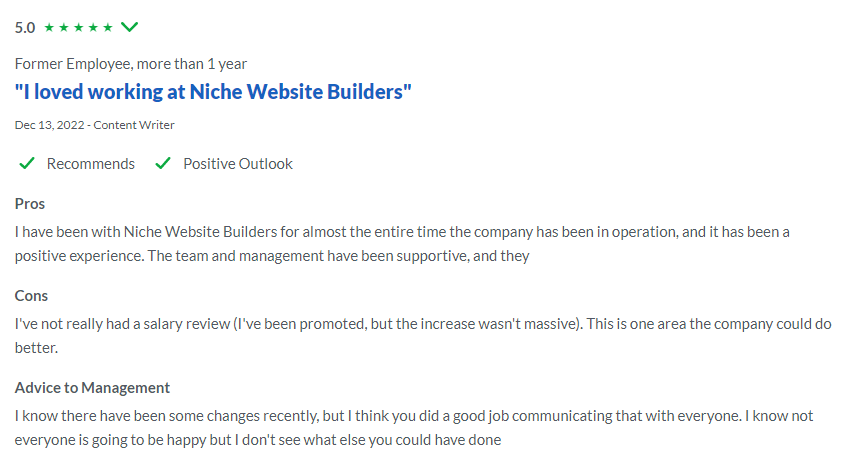
Also, always be bold and ask other SEOs for their recommendations, either one to one or in groups and forums. Having someone advocate for a service they’ve used is one of the best ways to avoid disappointment.
Quality
Checking the quality of service the company provides is incredibly important, and I’m talking about more than the quality of the links it builds.
The customer service it provides, especially in the initial discovery and onboarding phases, can indicate what the service will look like in the long term.
You want to build a long-lasting relationship with a provider so that you don’t have to go through this process every few months. Knowing that the people you’re working with will take care of you and your sites makes all the difference.
You’ll want to work with a provider that can assess your site and curate a link building strategy designed to meet your individual goals. You’ll also want to work with someone who will get back to you reasonably quickly and is happy to jump on a call when needed.
Scalability
Something else to consider is whether a link building service provider can increase the number of links you want to acquire.
If you’re going to pay for link building services because you have many websites you can’t manage alone, you may run into the same issue with a freelancer or small agency.
Even if you plan to start small, if you’re thinking of scaling up in the long term, this is something you should discuss up front. It is better to find a high-quality provider you’re happy with that can grow with you rather than start again later.
So now we’ve covered what to look for in a service provider, let’s look at some good services that can actually move the needle.
After checking out some of the most popular link building agencies, I’ve found the top services that are most frequently offered across the board, including:
- HARO link building.
- Digital PR.
- Guest posting.
- Niche edits.
- Skyscraper link building.
- Managed link building.
It’s worth noting that most of these services are based on a particular technique or tactic used to acquire links rather than a link building service per se. But as this is how most agencies market them, it’s worth discussing them this way.
You can see an example from an established link building provider here:
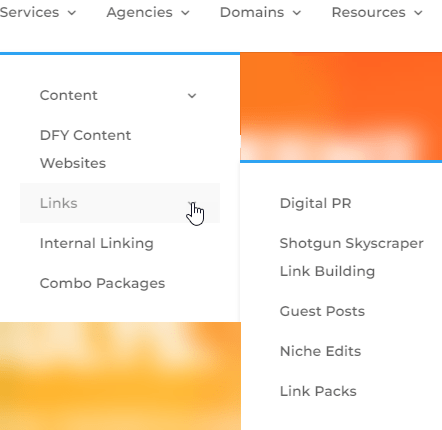
And here:
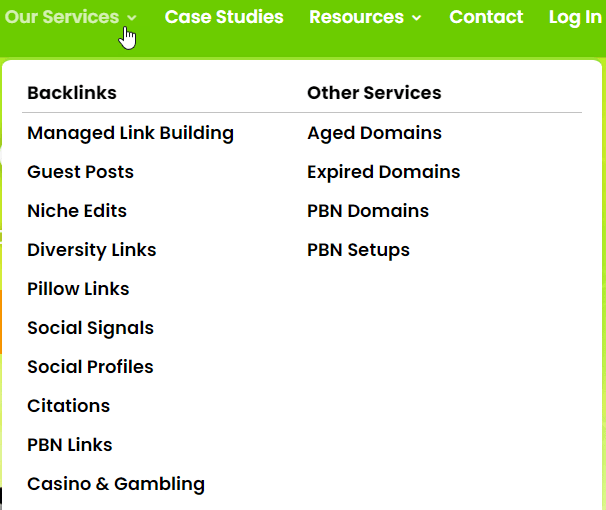
Let’s look at not only what each service is but also the benefits of having a link building provider acquire those links for you and what you can expect to pay for each service.
1. Help a Reporter Out (HARO) editorial link building
Using HARO and alternatives to acquire editorial links from highly authoritative websites is the ultimate white hat link building technique.
Sites like Help a Reporter Out, Terkel, Dot Star Media, and the like allow journalists to post queries looking for sources for articles they are currently writing. If you’re an expert on that topic, you can give quality insights and be quoted (with a link to your site) in their article.
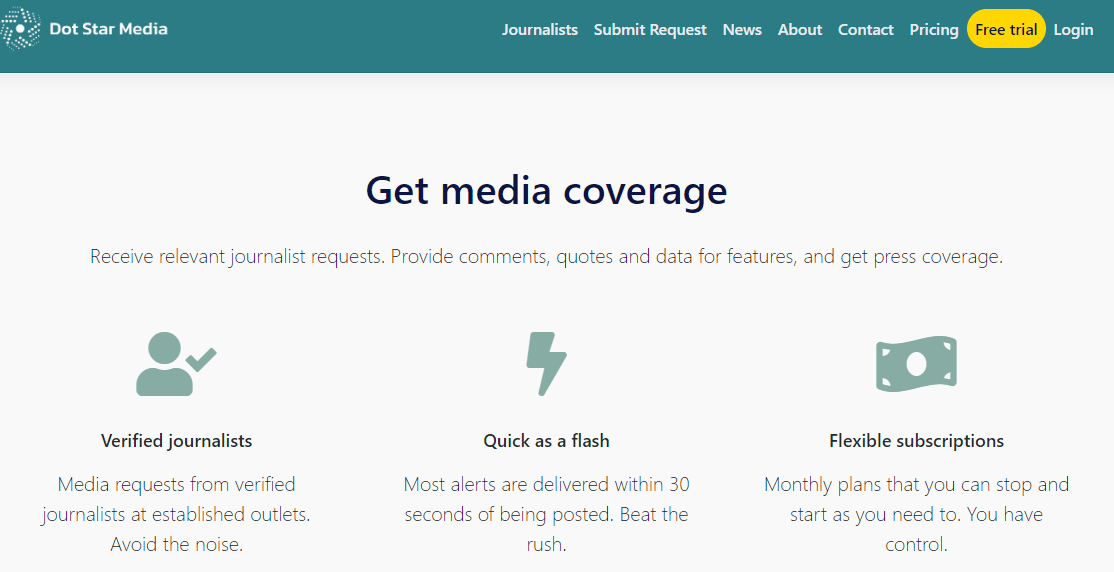
Not only can these links move the needle when coming from highly authoritative, niche-relevant sites that pass lots of link equity, but they can also help you improve experience, expertise, authority, and trust (E-E-A-T).
But are there benefits to using a service provider to build HARO links?
When it comes to well-established agencies that offer this service, they do a fantastic job of delivering the results you need with fully managed services. You only need to give them some initial information, and they will do the hard work for you.
However, they’re explicitly designed to scale these links and are working with multiple clients. To scale a fully managed service to that level, they usually have a large team of people pitching, tracking links, managing the accounts, liaising with clients, etc.
With that kind of team in place comes a higher cost. The average price range for this service with big agencies is $240–$700 per link.
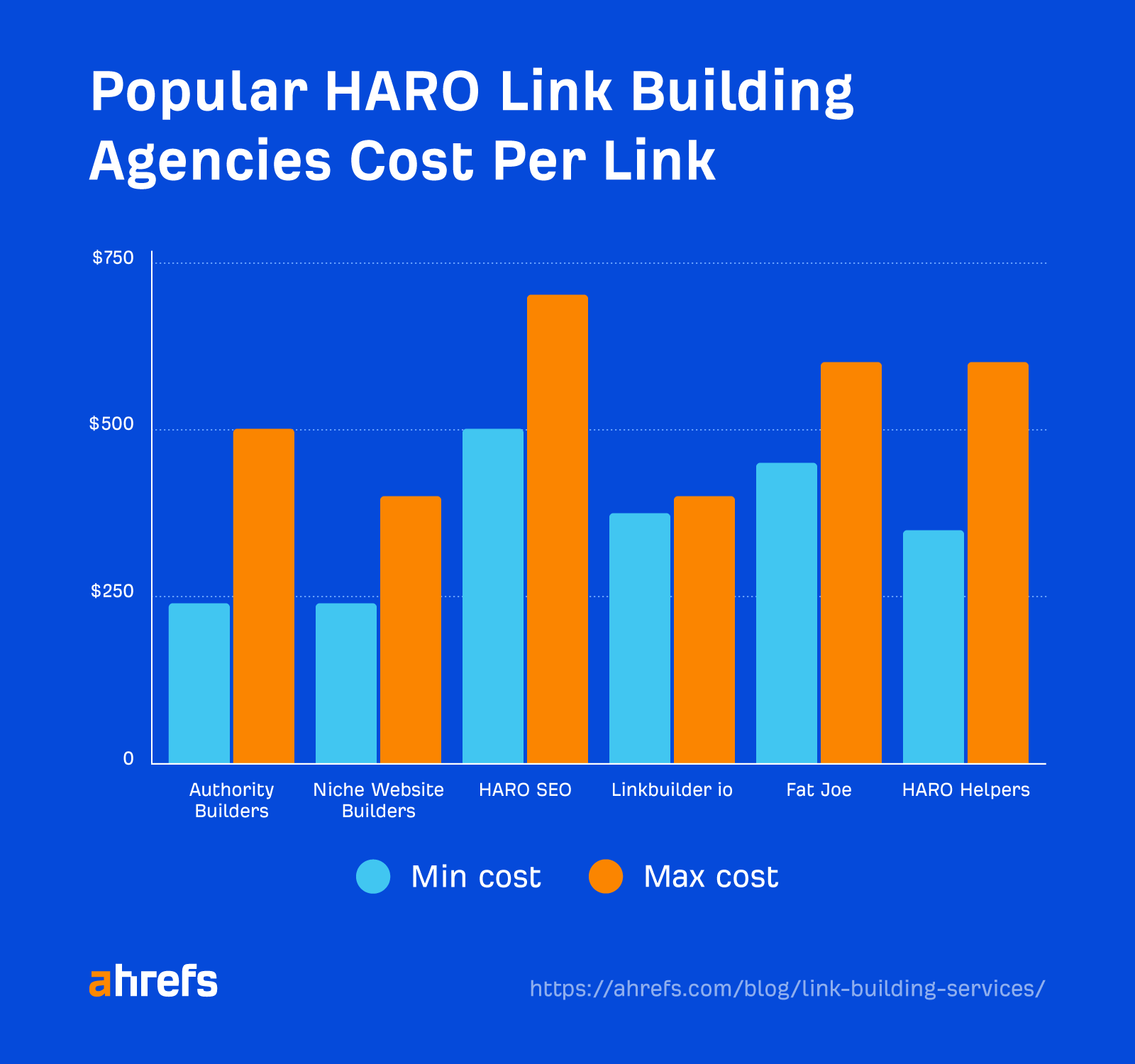
Unless you’re working on a large brand, enterprise site, or portfolio of websites, it probably isn’t worth it. However, if you need more time or have too many sites to manage yourself, you can find a freelancer who can help you at a more budget-friendly price tag.
It’s worth mentioning that most good freelancers will still have the cost of paid tools to cover, and they’ll likely pitch for multiple clients on one platform. Not to mention the hard work and time that go into crafting quality pitches. You can find someone who can do the job well for $200–$350 per link.
2. Digital PR
Like HARO link building, digital PR is one of the best ways to build high-authority links while also gaining brand exposure, driving traffic, and improving E-E-A-T.
But unlike HARO link building—where you approach journalists who have already advertised their need for sources on a particular topic—digital PR techniques create creative campaigns that proactively approach journalists to get the word out about your business.
Many different techniques can be used, including:
- Press releases
- Data-led campaigns
- Newsjacking
- Reactive PR
Arguably, digital PR is something you can only do with the help of an agency. Unless you’re a PR expert yourself and have time to dedicate to it, you’re not going to get the same results as a quality agency can.
Digital PR is an “always-on” tactic that needs a team of people monitoring what’s trending that can put together an entire campaign as soon as something happens.
A great example is how search-first creative agency Rise at Seven quickly responded to this creative campaign from Marmite:

Within 45 minutes of this campaign going live, Rise at Seven executives responded with their creative version on behalf of their client, Auto Glass, which virtually responded to fix the broken windshield:

The high-quality work needed to execute digital PR tactics successfully comes at a high cost. Most digital PR agencies with an SEO focus have a minimum monthly retainer of between $4,000 and $15,000.
3. Guest posting link building
Building links through guest posting is the most popular way to build links among SEO professionals, according to Authority Hacker’s link building survey.
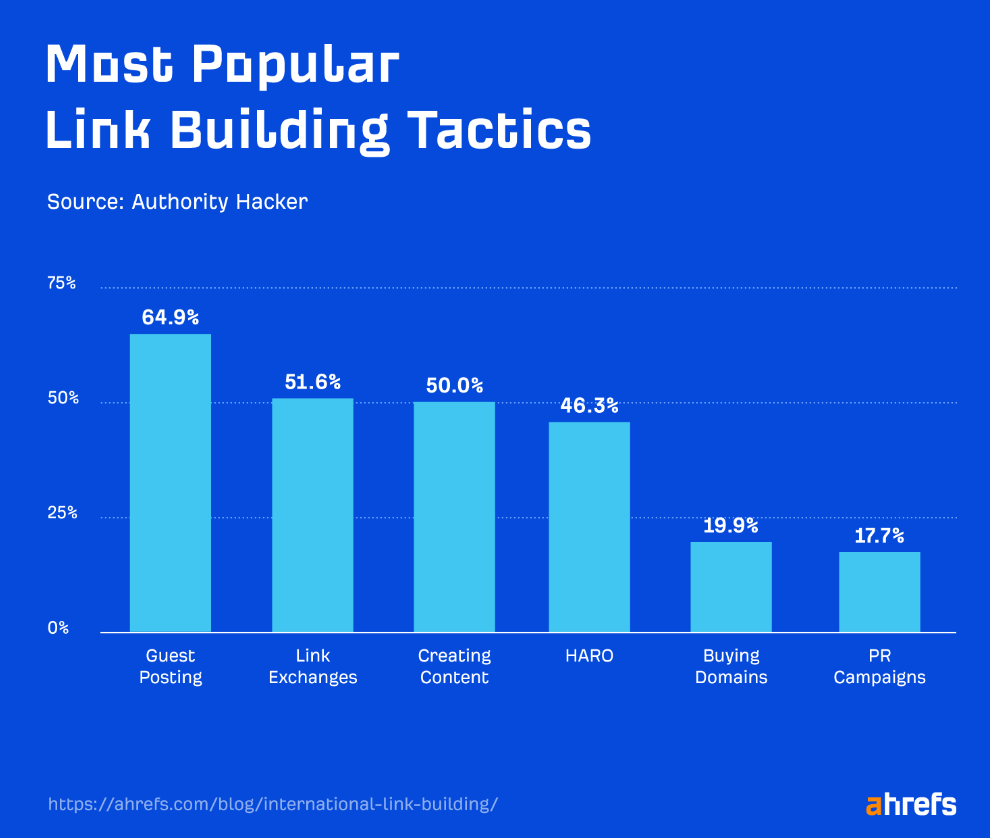
This service requires the provider to find high-quality, niche-relevant websites with a good amount of traffic and a strong backlink profile. Then the provider has to pitch the site admins topic ideas for a guest post to be added on the site.
This can be either offering to create an updated version of existing content that is currently underperforming or a new but relevant idea.
There’s a reason why guest posting is the most popular link building tactic among SEOs—because it works. Links are also relatively easy to achieve, as it is usually a win-win for both sites.
Plus, a quality service provider will have built up a database of sites it’s worked with and nurtured relationships with web admins, which means it can often acquire links easier than you would through hours and hours of outreach.
The thing is, quality comes at a cost. An agency offering guest posts as a service has a team of outreach specialists, content writers, and editors to produce the posts, plus site administration fees (the cost of someone to edit and upload the content) to cover.
If you want to build guest post links properly at scale, the average cost of $250–$400 per link is generally worth it.
4. Niche edits
Niche edits, also known as link placements, are where a link is placed on a site within an existing piece of content.
This can be that a current link in the content needs to be updated or fixed. Or simply because you think their audience will benefit from your content as a source of further reading.
Niche edit links can achieve similar results to guest post links but at a more budget-friendly cost (as there is no content to write). For this service, most reputable providers charge between $150 and $300 per link.
Be warned that many link building providers will simply buy these links. For the most part, providers will work from a list of sites that have link placement prices within a set budget.
For example, I have worked with agencies in the past that are willing to pay a fee of up to $100 for any link and they continuously do outreach to build upon that list. Then, whenever they need a link, they simply reach out to a relevant site and arrange for a link to be placed.
Obviously, buying links is something you need to be careful of, as it is against Google’s guidelines (unless the link contains a “nofollow” or “sponsored” link attribute). Many providers simply won’t inform you this is how they do business.
However, some will inform you that a site has asked for an additional fee and whether you are happy to pay that to give you the option. This is usually only the case for highly authoritative sites asking for $200+. But at least then, you can decide if this is something you’re happy to do.
5. Skyscraper link building
Skyscraper link building is a technique where you find a popular piece of content with lots of backlinks, and then you create your own (better) high-quality content to attempt to steal your competitor’s links.

When done well, skyscraper link building can land you dozens of high-quality links quickly. The problem is this tactic is a lot for one person to handle. You must do all the research, create content, find sites to reach out to, and then perform email outreach to gain links.
That’s why skyscraper link building is one of the best services you can outsource to an agency. Not only will it have a dedicated team to handle the entire process, but it will also have the professional tools needed to execute the services successfully at scale.
You can’t be surprised that this doesn’t come cheap. Most SEO agencies that offer skyscraper link building have different packages, depending on how many links you’re looking to build. They usually range from around $900–$3,000.
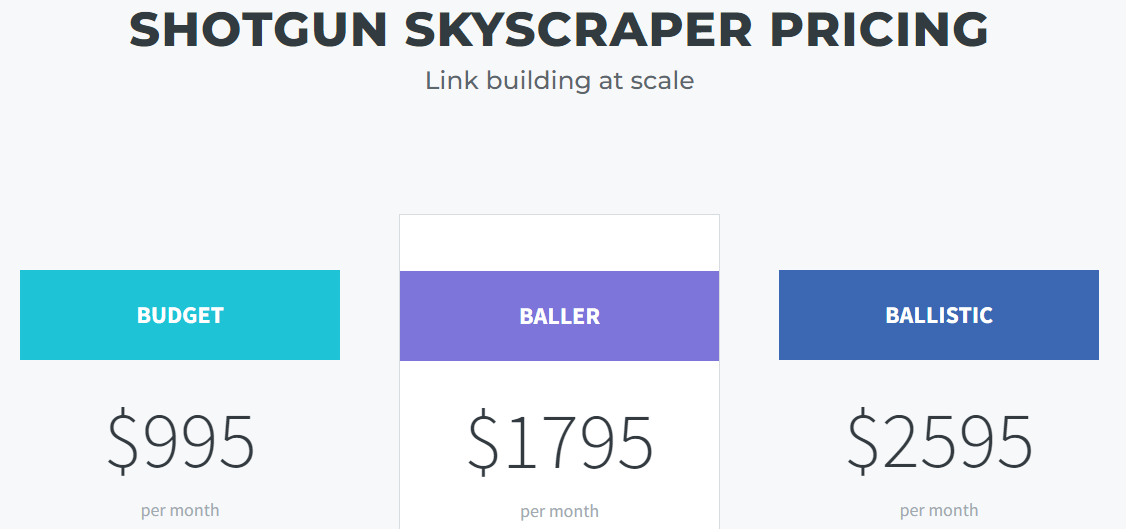
6. Managed link services
Managed link services and link packs are packaged services that agencies offer to cover all of your link building needs in one place. The idea is you will get a certain number of different types of links per month. For example:
- Five guest post links
- Three niche edit links
- Two HARO links
Some agencies will offer different packs at set prices for you to choose from. Others will charge a set retainer and customize link building packages based on your current backlink profile, competitor analysis, and goals.
If you’re someone with a large portfolio of sites or even a large enterprise site that doesn’t want the hassle of managing and training a dedicated in-house link building team, using a managed link building service from a reputable provider is worth it.
Prices can range between $2,500 and $10,000 per month.
Similar to how there are plenty of bad link building providers, link building services can be questionable at best and downright “black hat” at worst.
Even some well-known providers offer several services that aren’t for everyone, so it’s a good idea to know what you should avoid—even more so than what you’re looking for.
1. Anything cheap
Although paying someone $250 per hour to build links to your site doesn’t guarantee you’ll receive quality service, for the most part, you get what you pay for.
Most agencies will have a team that will spend hours performing outreach and producing content. Not to mention paid tools that allow team members to do their jobs well. So it’s reasonable to expect a particular price tag with a professional service.
Therefore, anyone on platforms like Fiverr, Upwork, or Freelancer offering 500 links for $10 will provide a service that either does nothing at all or, worse, more harm than good.
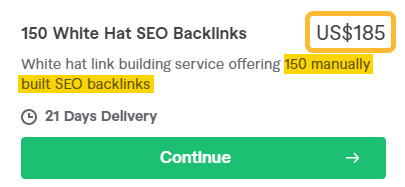
2. DA/DR increasing services
These services can be seen across freelancing platforms and guarantee to boost your Ahrefs’ Domain Rating (DR) or Moz’s Domain Authority (DA) above a particular metric. The idea is to make your site appear more authoritative than it is.
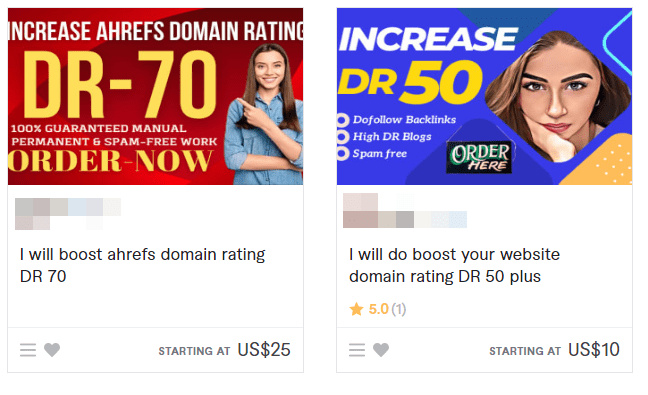
They involve spamming your site with a load of links that can look like this:
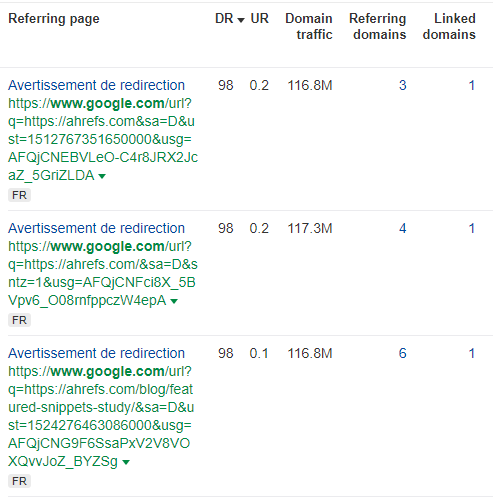
It’s worth stressing that both DA and DR are not considered by Google and hold no influence over your rankings. If your DR or DA is manipulated, it is solely to impress others using Ahrefs to check out your site.
These attempts of metrics manipulation naturally call for response from the SEO tool providers. Ahrefs worked on implementing changes to the DR calculation to try to make these artificial DR boosts ineffective.
3. Negative SEO links
Negative SEO links, or “SEO attacks,” as they are sometimes referred to, are spamming your competitors with poor-quality links in hopes of negatively impacting their rankings and traffic.
Usually, these services spam a site with millions of links at a minimal cost.
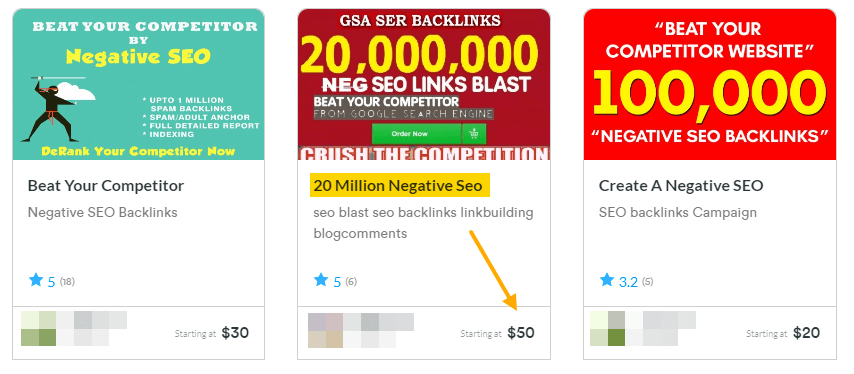
Not only is this completely unethical, it is also, quite frankly, downright lazy. And it most likely won’t do anything. If you’re spamming your competitor just to get a leg up on the competition rather than spending time building up your backlink profile, you’re doing SEO wrong.
4. Private blog networks (PBNs)
PBNs are a group of websites created specifically to link to one another and create the appearance that a website has “earned” backlinks from other websites.
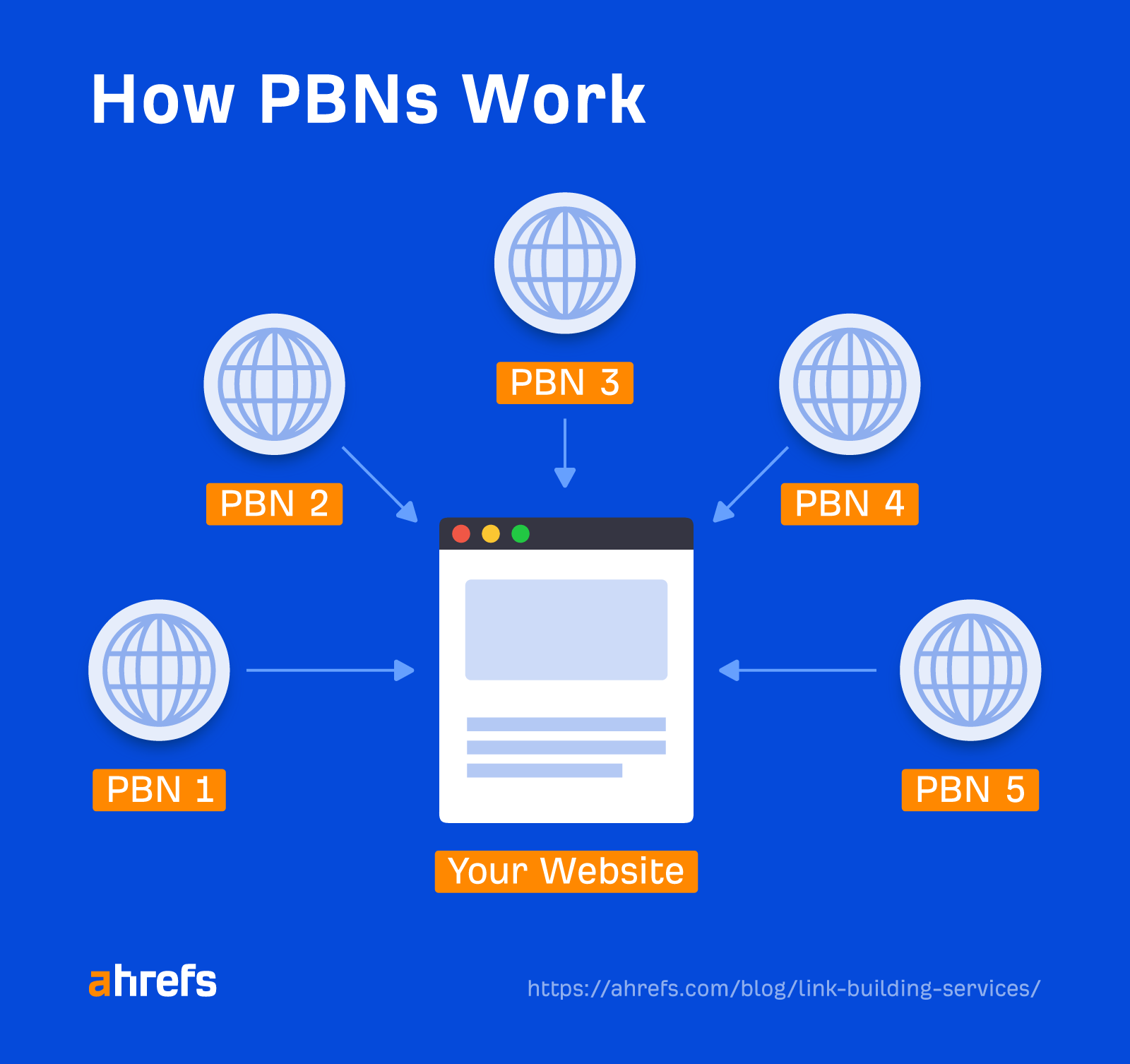
By linking to your site from every other site in your PBN, you artificially establish trust signals in the hopes that Google will recognize them as legitimate websites and rank you higher.
Private blog networks used for link building are considered link spam and can land you with a Google penalty.
5. Press releases that aren’t newsworthy
A press release can be a genuinely helpful tool for building high-quality links and brand awareness when your company has something newsworthy to share, such as a merger or acquisition.
The issue arises when companies run a press release weekly solely to build links on everything from Karen-from-accounts’ new Labradoodle to “Flip-Flop Fridays.”

This is not only considered a spammy practice but will also most likely not be picked up by the sites you want to obtain links from. This makes them worthless.
6. Tiered links
Tiered link building is the practice of building links to pages you have already built links to your site from.
The idea is to increase the link equity to your site by improving the backlink profile of the page linking to yours.
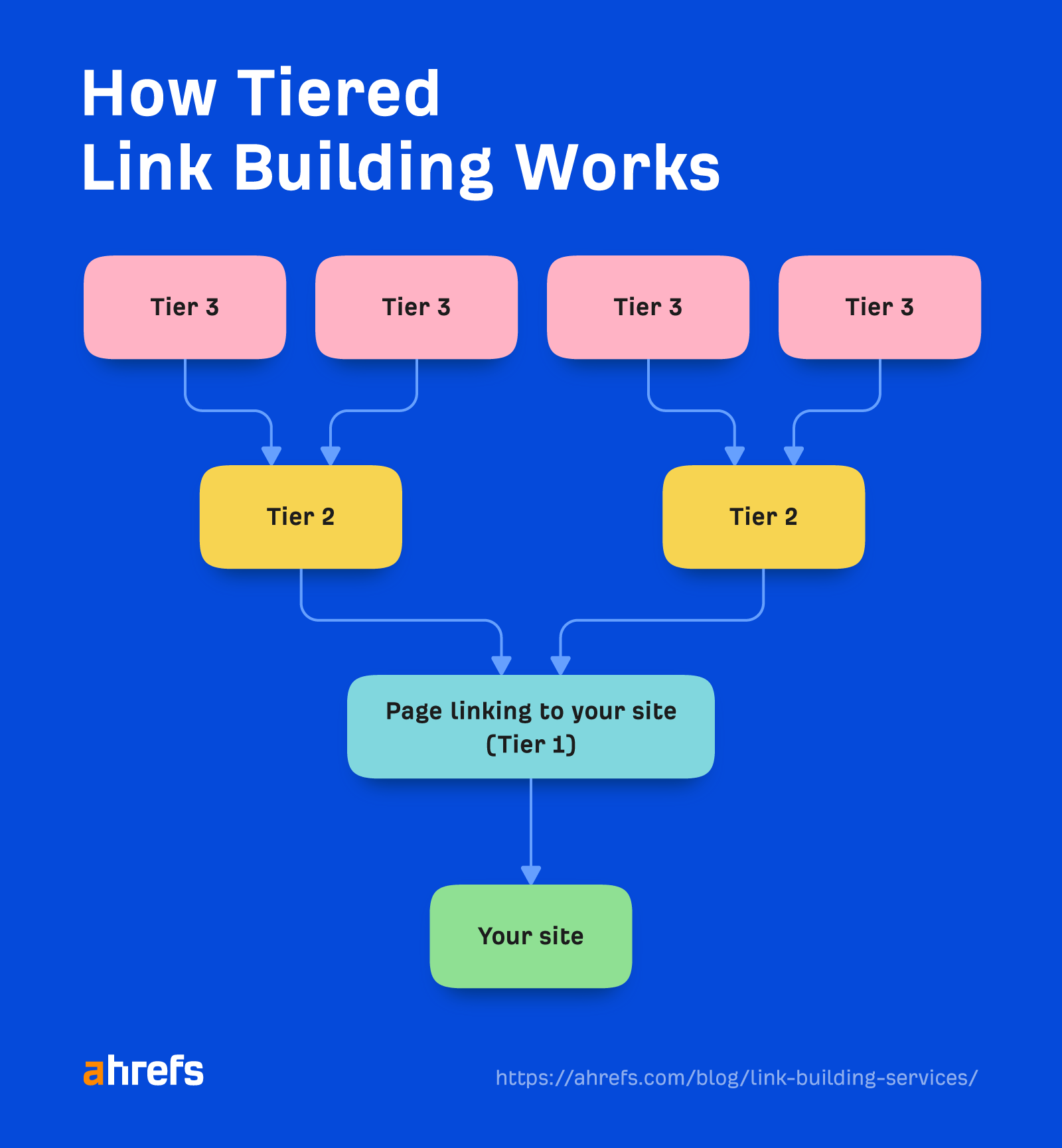
This can work well when done correctly (by manually building high-quality links on each tier). I would never recommend doing this on a client site. But if you want to on your personal sites, that’s your choice.
Most tiered link building services involve spamming the Tier 1 site with low-quality links using automated tools like Money Robot. This unethical practice is used by SEOs who are happy to spam somebody else’s site with poor-quality links.
Final thoughts
Link building services can be the secret to SEO success for anyone who wants to build high-quality links at scale.
The key is finding a high-quality service provider that not only delivers what you need but also is someone you can work with in the long term and grow with you.
Have you got questions? Ping me on Twitter.
SEO
56 Google Search Statistics to Bookmark for 2024
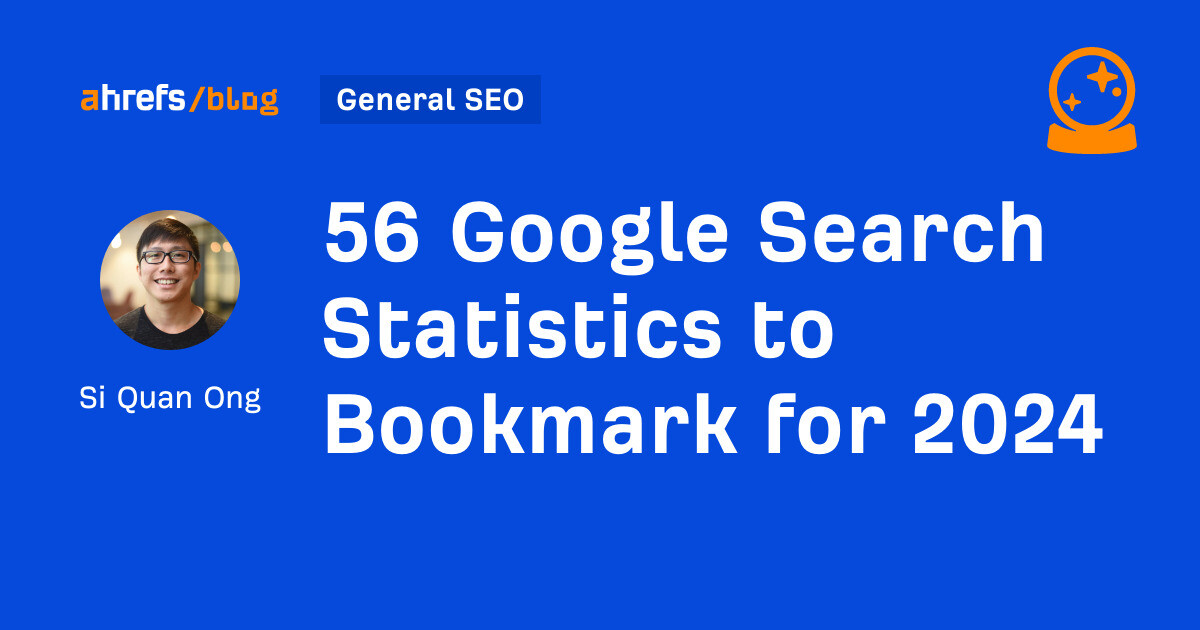
If you’re curious about the state of Google search in 2024, look no further.
Each year we pick, vet, and categorize a list of up-to-date statistics to give you insights from trusted sources on Google search trends.
Check out more resources on how Google works:
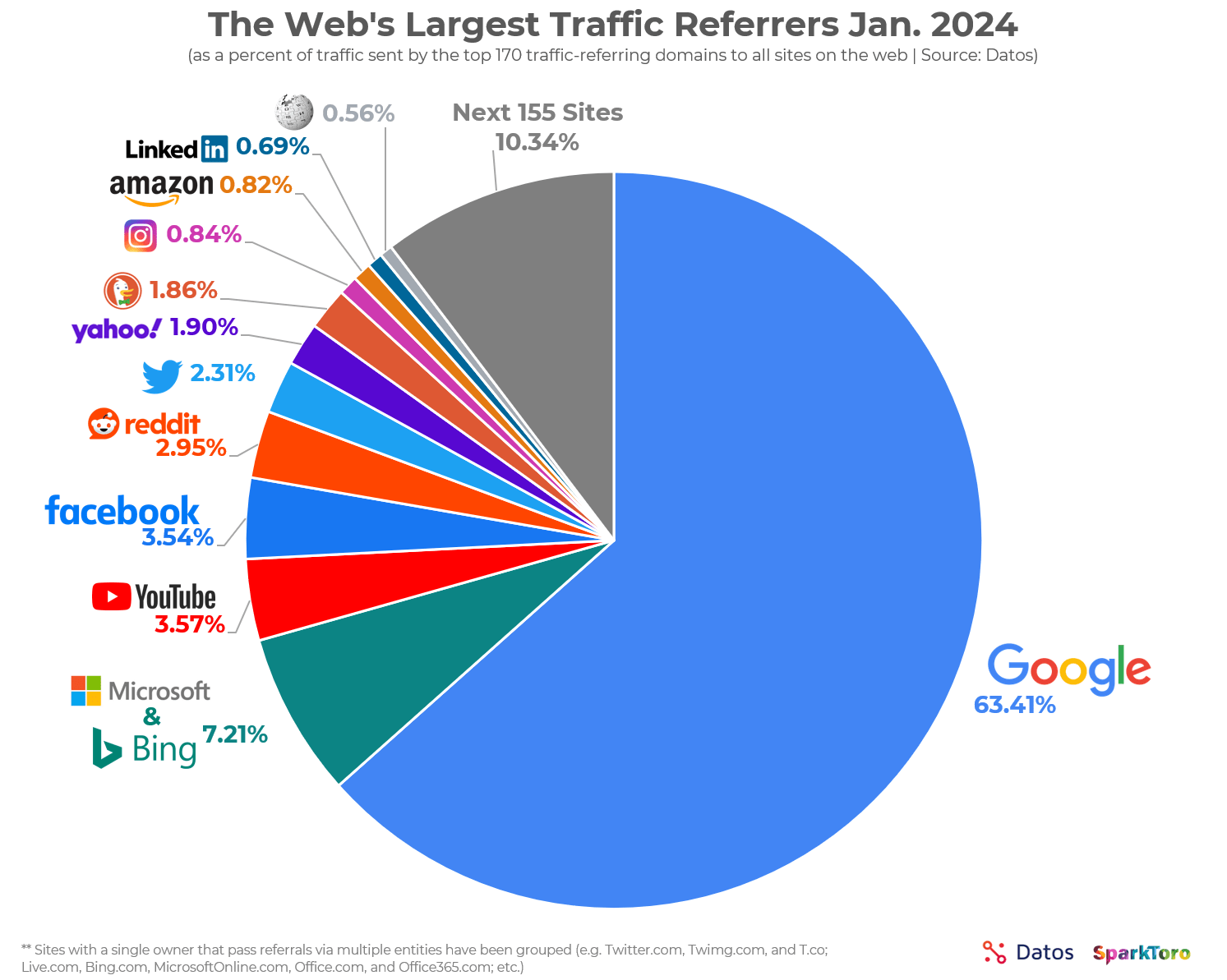

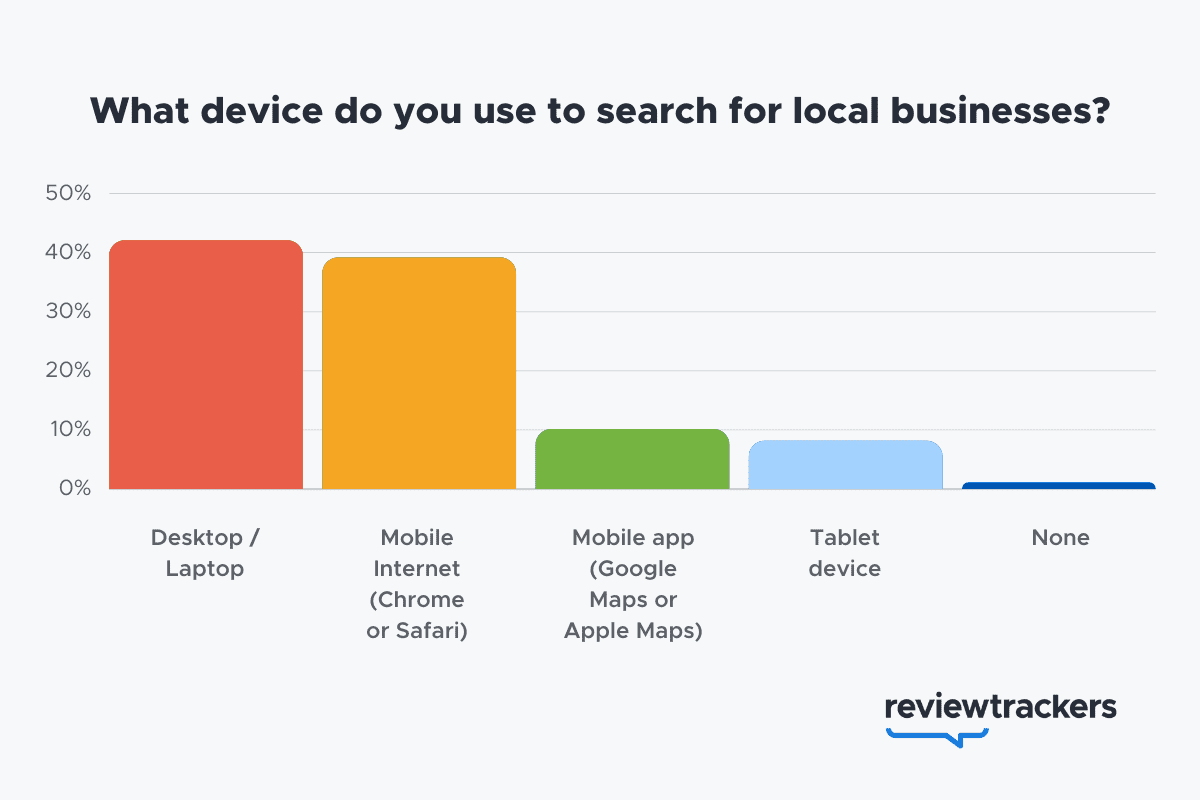

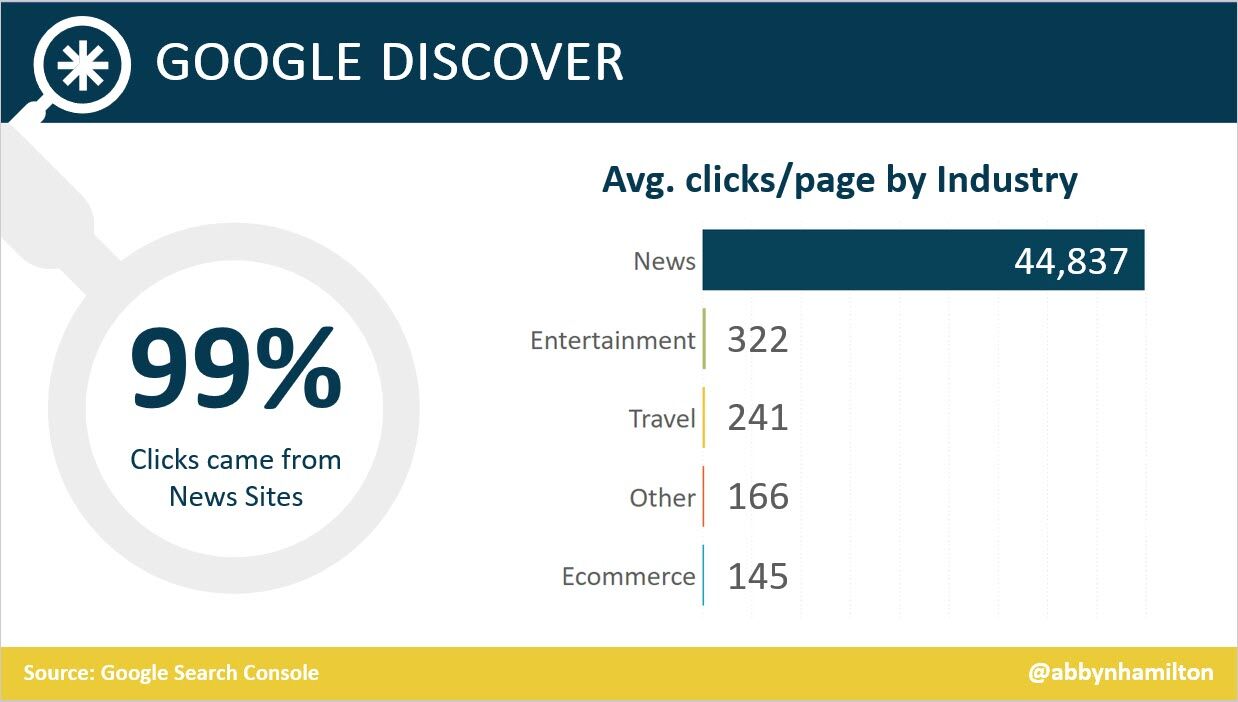

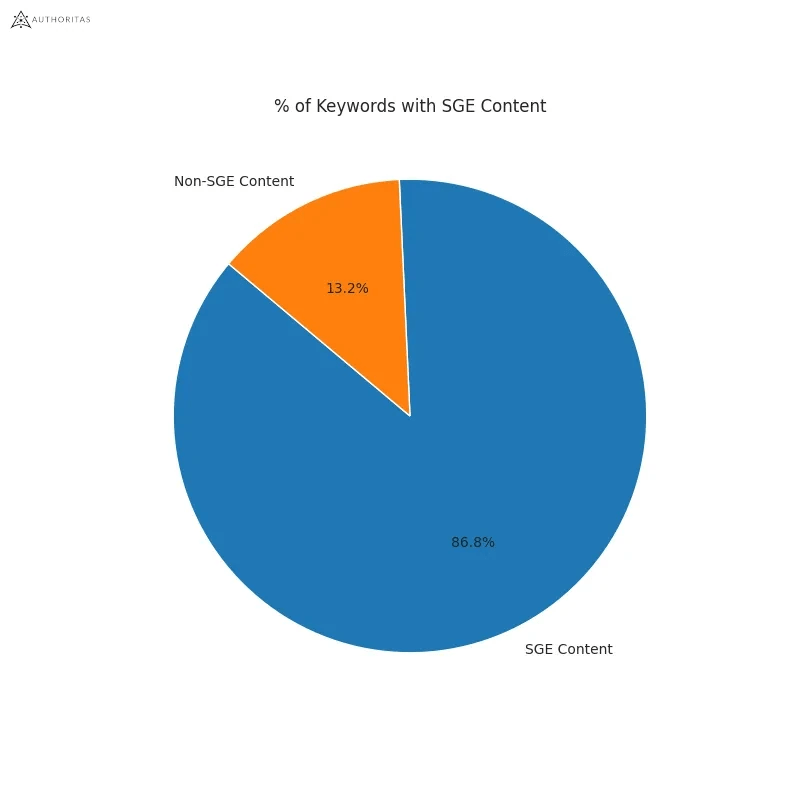

Learn more
SEO
How To Use ChatGPT For Keyword Research

Anyone not using ChatGPT for keyword research is missing a trick.
You can save time and understand an entire topic in seconds instead of hours.
In this article, I outline my most effective ChatGPT prompts for keyword research and teach you how I put them together so that you, too, can take, edit, and enhance them even further.
But before we jump into the prompts, I want to emphasize that you shouldn’t replace keyword research tools or disregard traditional keyword research methods.
ChatGPT can make mistakes. It can even create new keywords if you give it the right prompt. For example, I asked it to provide me with a unique keyword for the topic “SEO” that had never been searched before.
“Interstellar Internet SEO: Optimizing content for the theoretical concept of an interstellar internet, considering the challenges of space-time and interplanetary communication delays.”
Although I want to jump into my LinkedIn profile and update my title to “Interstellar Internet SEO Consultant,” unfortunately, no one has searched that (and they probably never will)!
You must not blindly rely on the data you get back from ChatGPT.
What you can rely on ChatGPT for is the topic ideation stage of keyword research and inspiration.
ChatGPT is a large language model trained with massive amounts of data to accurately predict what word will come next in a sentence. However, it does not know how to do keyword research yet.
Instead, think of ChatGPT as having an expert on any topic armed with the information if you ask it the right question.
In this guide, that is exactly what I aim to teach you how to do – the most essential prompts you need to know when performing topical keyword research.
Best ChatGPT Keyword Research Prompts
The following ChatGPT keyword research prompts can be used on any niche, even a topic to which you are brand new.
For this demonstration, let’s use the topic of “SEO” to demonstrate these prompts.
Generating Keyword Ideas Based On A Topic
What Are The {X} Most Popular Sub-topics Related To {Topic}?
The first prompt is to give you an idea of the niche.
As shown above, ChatGPT did a great job understanding and breaking down SEO into three pillars: on-page, off-page & technical.
The key to the following prompt is to take one of the topics ChatGPT has given and query the sub-topics.
What Are The {X} Most Popular Sub-topics Related To {Sub-topic}?
For this example, let’s query, “What are the most popular sub-topics related to keyword research?”
Having done keyword research for over 10 years, I would expect it to output information related to keyword research metrics, the types of keywords, and intent.
Let’s see.
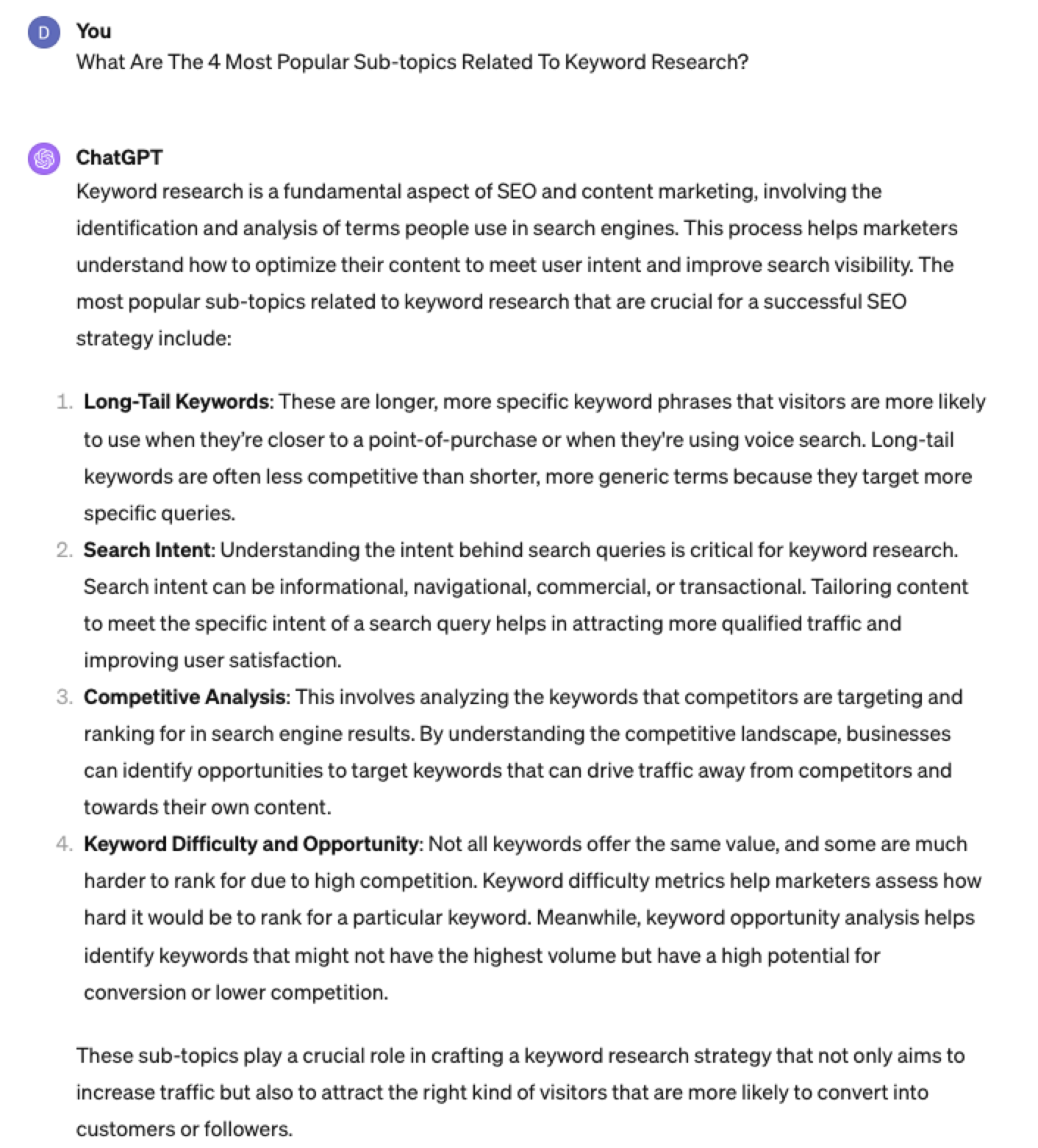 Screenshot from ChatGPT 4, April 2024
Screenshot from ChatGPT 4, April 2024Again, right on the money.
To get the keywords you want without having ChatGPT describe each answer, use the prompt “list without description.”
Here is an example of that.
List Without Description The Top {X} Most Popular Keywords For The Topic Of {X}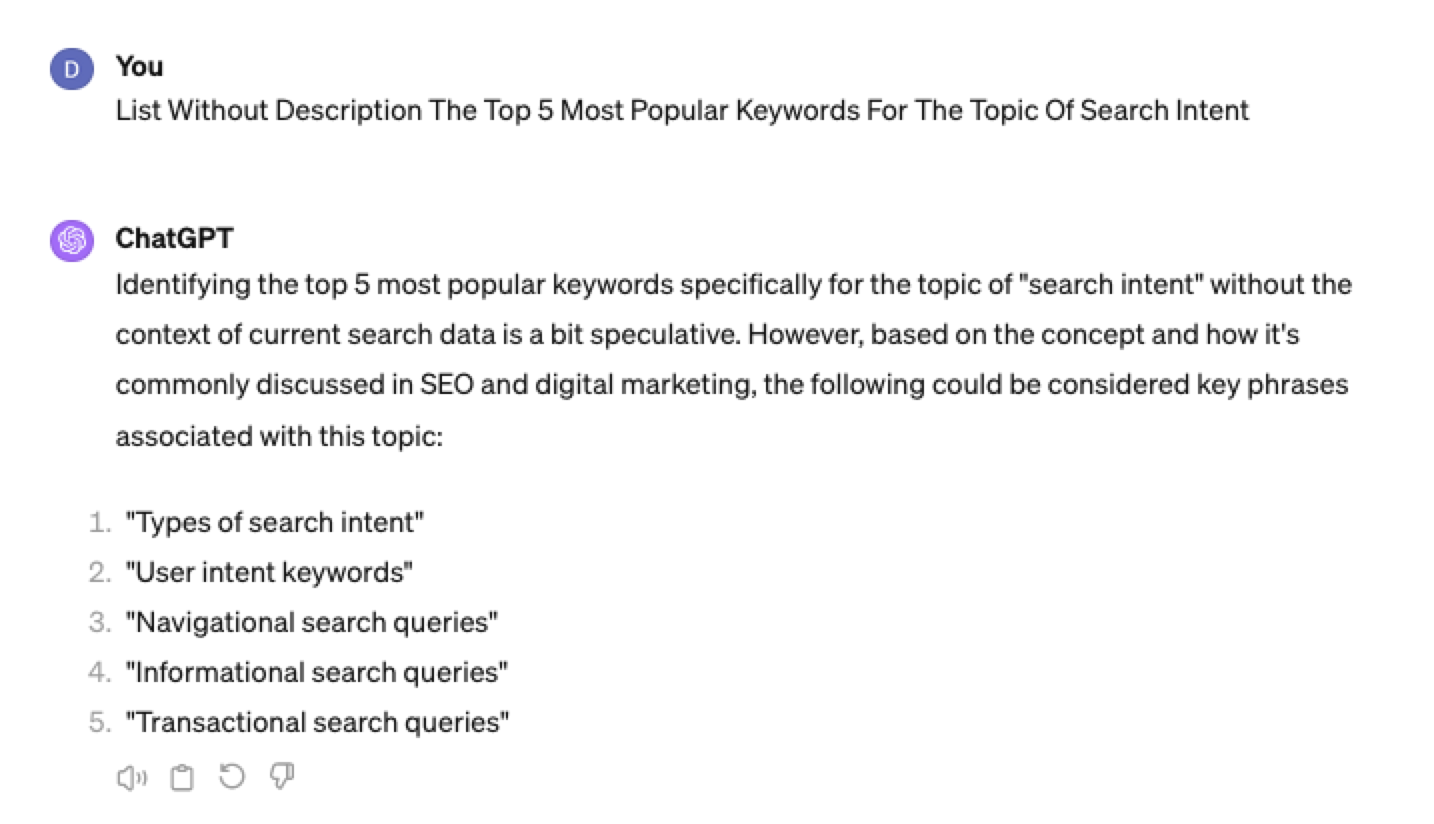
You can even branch these keywords out further into their long-tail.
Example prompt:
List Without Description The Top {X} Most Popular Long-tail Keywords For The Topic “{X}”
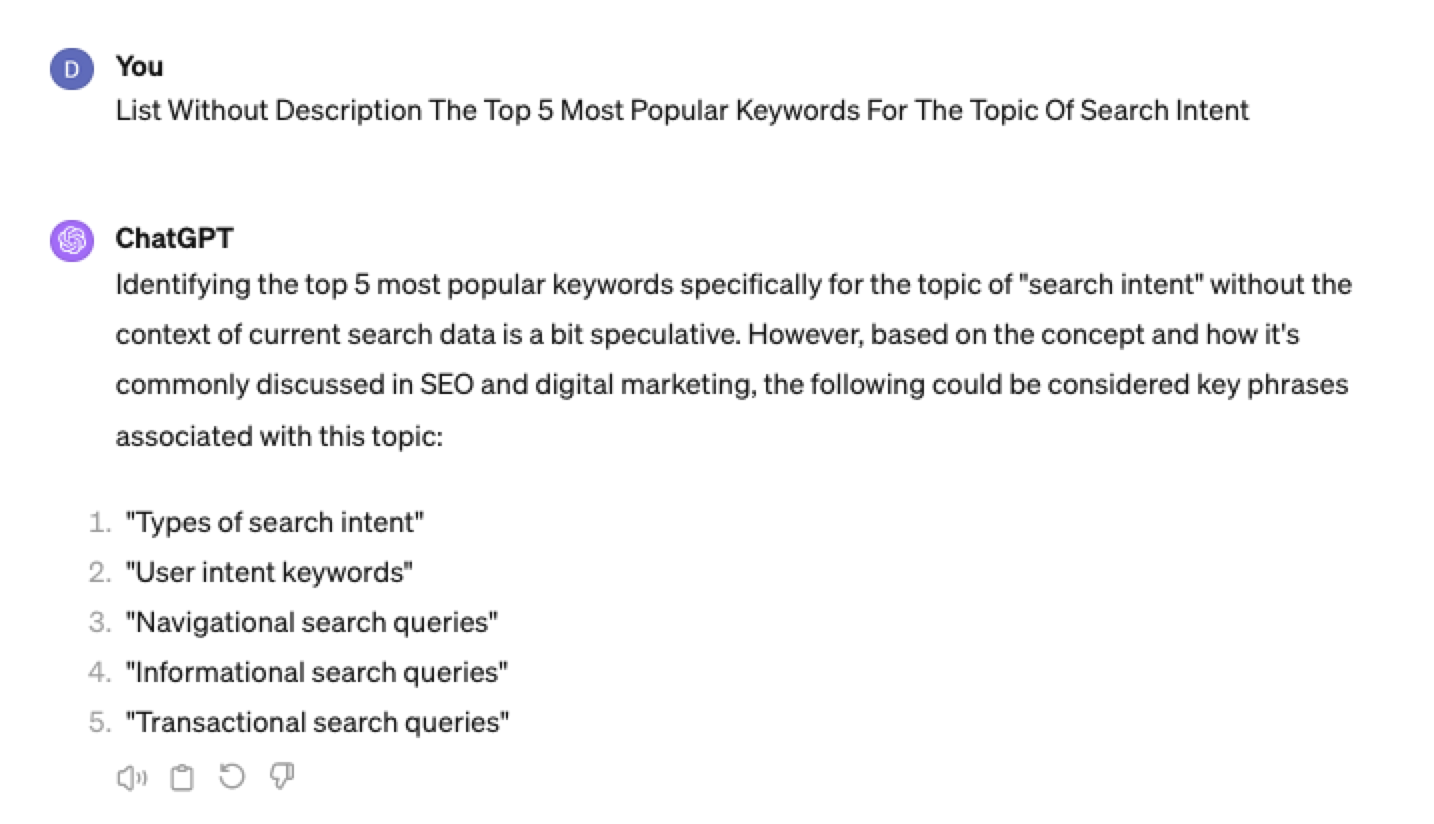 Screenshot ChatGPT 4,April 2024
Screenshot ChatGPT 4,April 2024List Without Description The Top Semantically Related Keywords And Entities For The Topic {X}
You can even ask ChatGPT what any topic’s semantically related keywords and entities are!
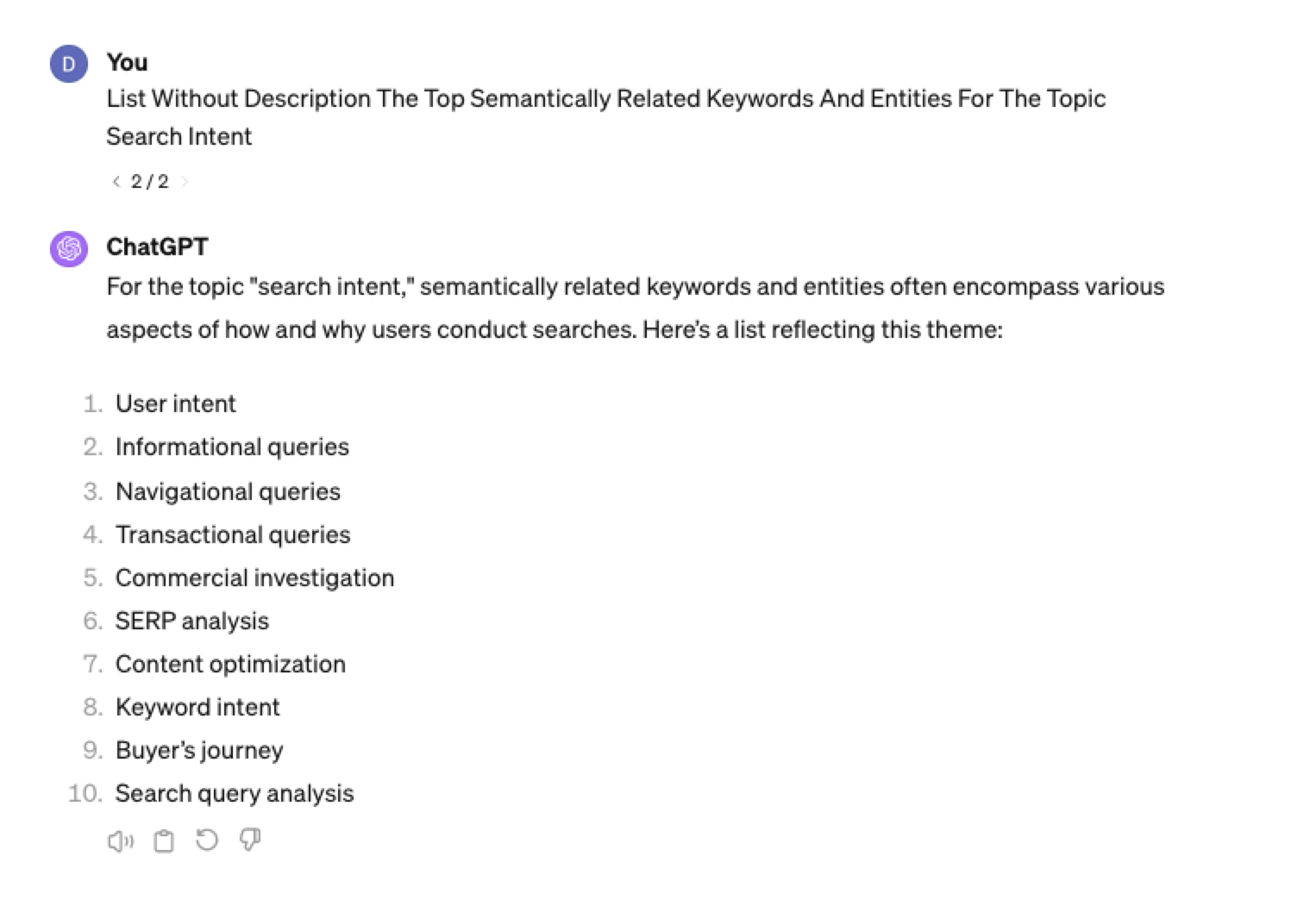 Screenshot ChatGPT 4, April 2024
Screenshot ChatGPT 4, April 2024Tip: The Onion Method Of Prompting ChatGPT
When you are happy with a series of prompts, add them all to one prompt. For example, so far in this article, we have asked ChatGPT the following:
- What are the four most popular sub-topics related to SEO?
- What are the four most popular sub-topics related to keyword research
- List without description the top five most popular keywords for “keyword intent”?
- List without description the top five most popular long-tail keywords for the topic “keyword intent types”?
- List without description the top semantically related keywords and entities for the topic “types of keyword intent in SEO.”
Combine all five into one prompt by telling ChatGPT to perform a series of steps. Example:
“Perform the following steps in a consecutive order Step 1, Step 2, Step 3, Step 4, and Step 5”
Example:
“Perform the following steps in a consecutive order Step 1, Step 2, Step 3, Step 4 and Step 5. Step 1 – Generate an answer for the 3 most popular sub-topics related to {Topic}?. Step 2 – Generate 3 of the most popular sub-topics related to each answer. Step 3 – Take those answers and list without description their top 3 most popular keywords. Step 4 – For the answers given of their most popular keywords, provide 3 long-tail keywords. Step 5 – for each long-tail keyword offered in the response, a list without descriptions 3 of their top semantically related keywords and entities.”
Generating Keyword Ideas Based On A Question
Taking the steps approach from above, we can get ChatGPT to help streamline getting keyword ideas based on a question. For example, let’s ask, “What is SEO?”
“Perform the following steps in a consecutive order Step 1, Step 2, Step 3, and Step 4. Step 1 Generate 10 questions about “{Question}”?. Step 2 – Generate 5 more questions about “{Question}” that do not repeat the above. Step 3 – Generate 5 more questions about “{Question}” that do not repeat the above. Step 4 – Based on the above Steps 1,2,3 suggest a final list of questions avoiding duplicates or semantically similar questions.”
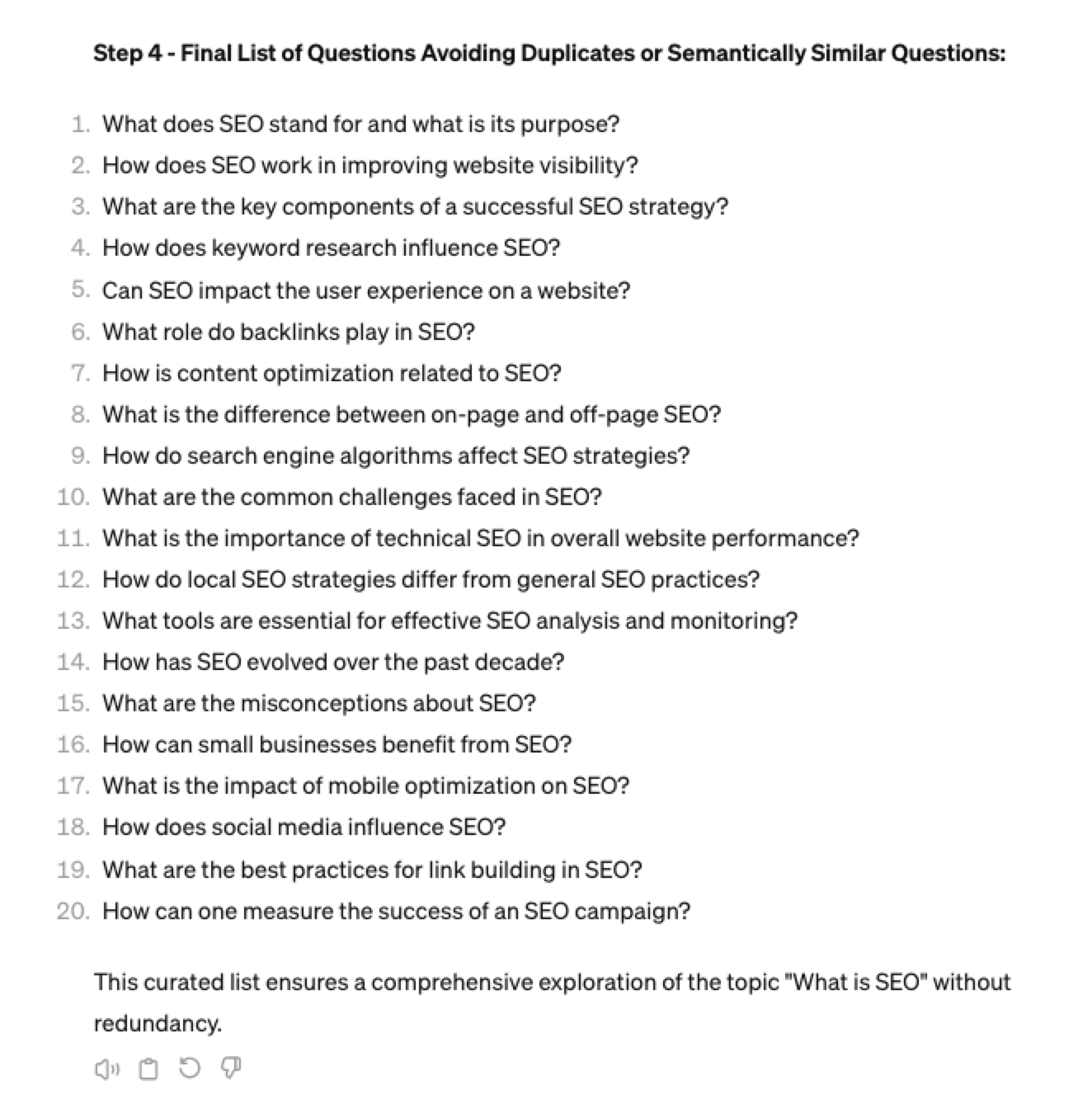 Screenshot ChatGPT 4, April 2024
Screenshot ChatGPT 4, April 2024Generating Keyword Ideas Using ChatGPT Based On The Alphabet Soup Method
One of my favorite methods, manually, without even using a keyword research tool, is to generate keyword research ideas from Google autocomplete, going from A to Z.
-
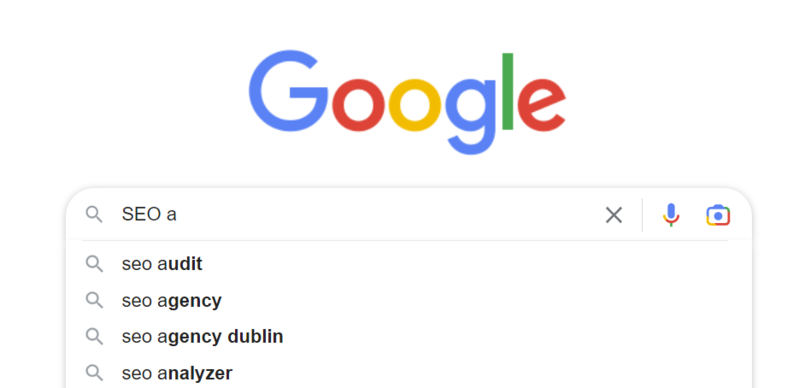 Screenshot from Google autocomplete, April 2024
Screenshot from Google autocomplete, April 2024
You can also do this using ChatGPT.
Example prompt:
“give me popular keywords that includes the keyword “SEO”, and the next letter of the word starts with a”
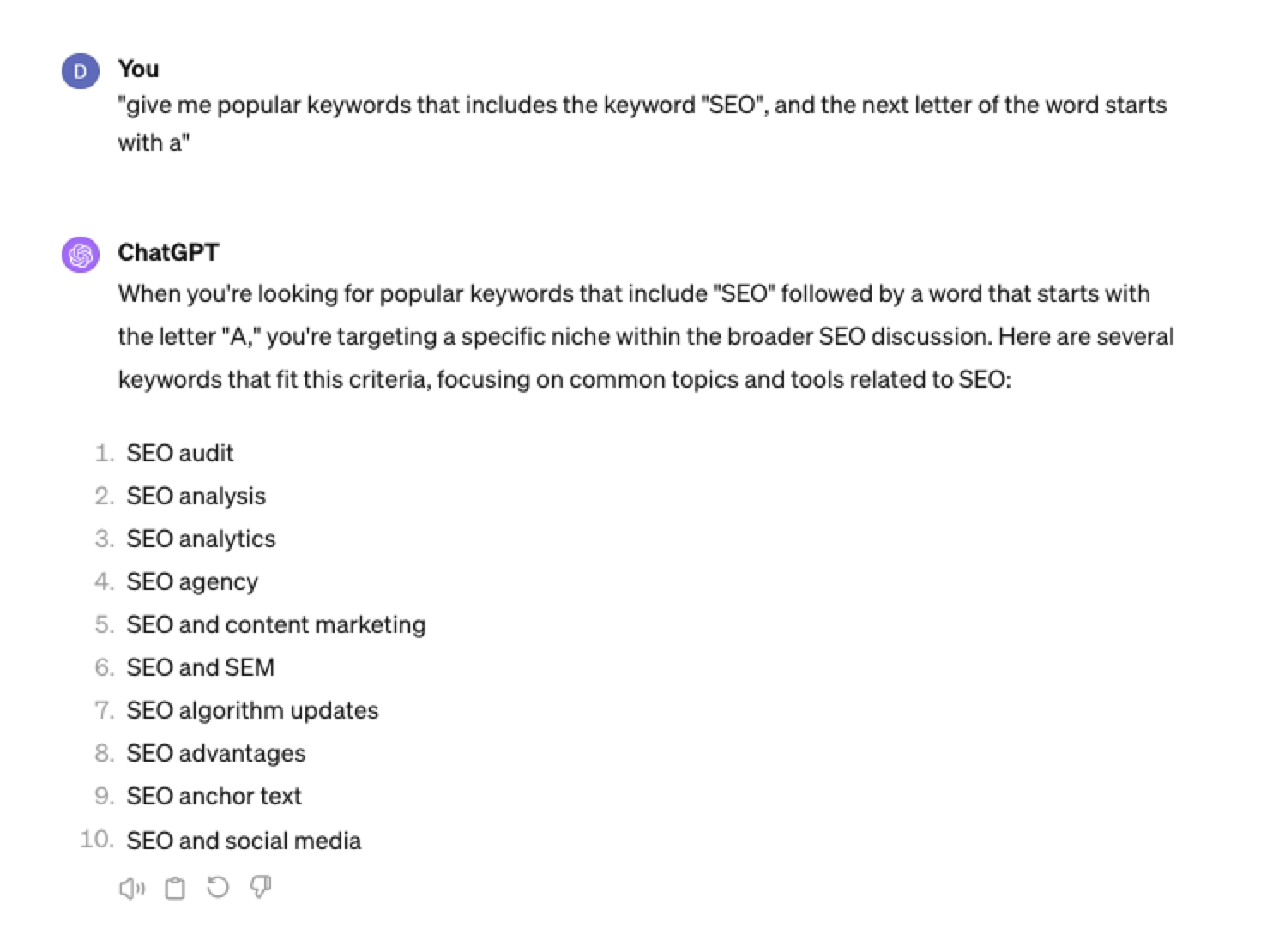 Screenshot from ChatGPT 4, April 2024
Screenshot from ChatGPT 4, April 2024Tip: Using the onion prompting method above, we can combine all this in one prompt.
“Give me five popular keywords that include “SEO” in the word, and the following letter starts with a. Once the answer has been done, move on to giving five more popular keywords that include “SEO” for each letter of the alphabet b to z.”
Generating Keyword Ideas Based On User Personas
When it comes to keyword research, understanding user personas is essential for understanding your target audience and keeping your keyword research focused and targeted. ChatGPT may help you get an initial understanding of customer personas.
Example prompt:
“For the topic of “{Topic}” list 10 keywords each for the different types of user personas”
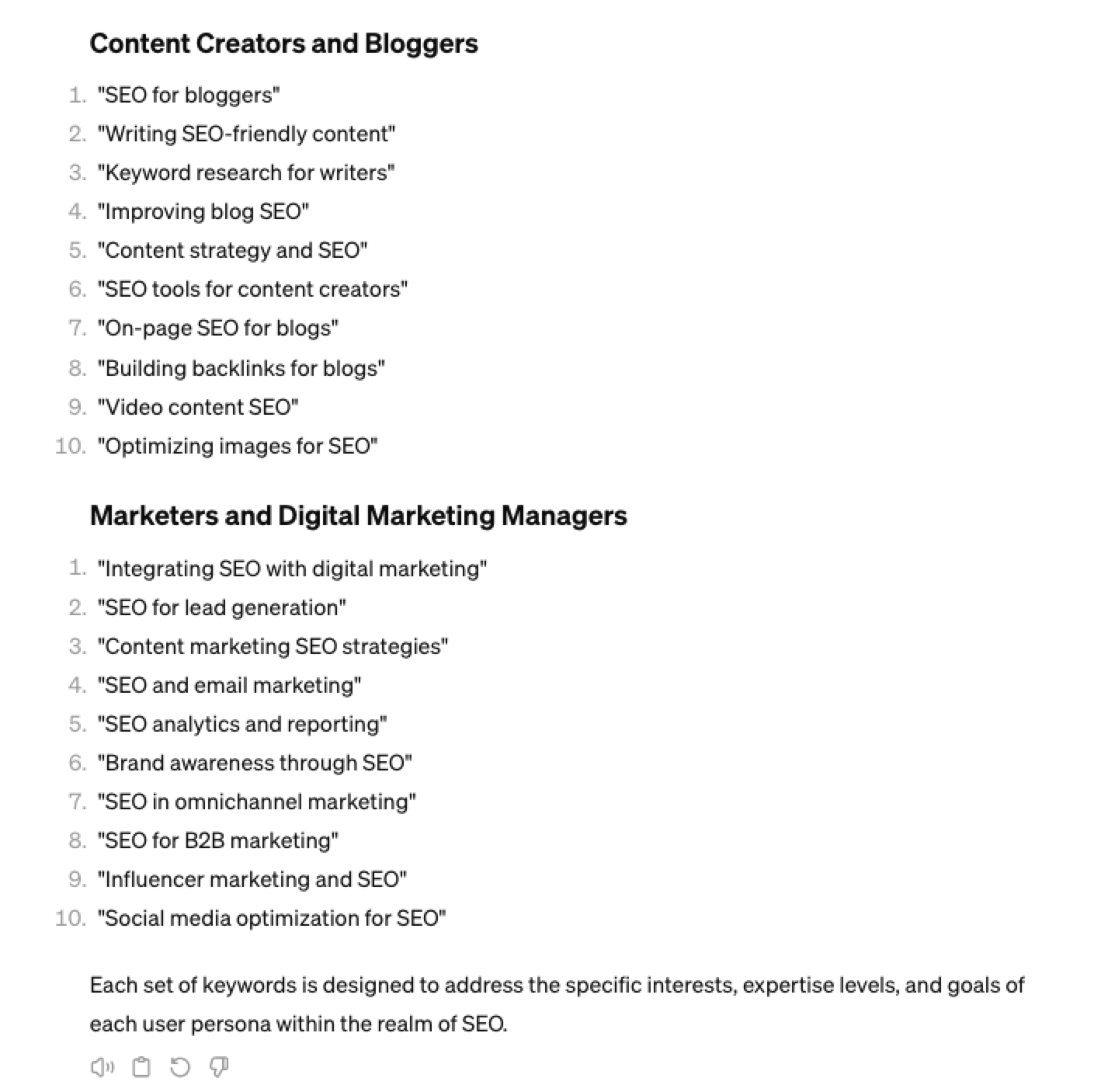 Screenshot from ChatGPT 4, April 2024
Screenshot from ChatGPT 4, April 2024You could even go a step further and ask for questions based on those topics that those specific user personas may be searching for:
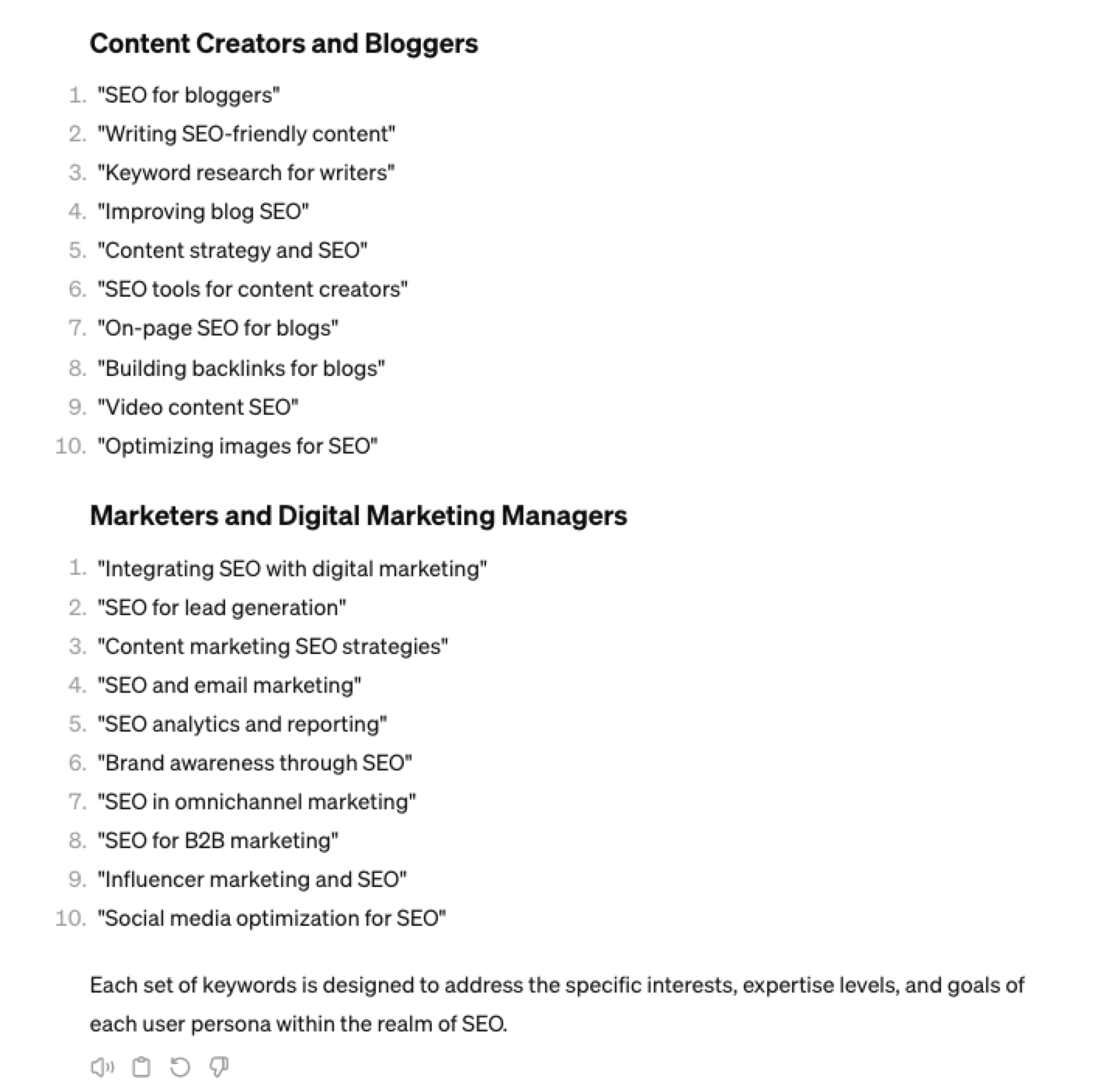 Screenshot ChatGPT 4, April 2024
Screenshot ChatGPT 4, April 2024As well as get the keywords to target based on those questions:
“For each question listed above for each persona, list the keywords, as well as the long-tail keywords to target, and put them in a table”
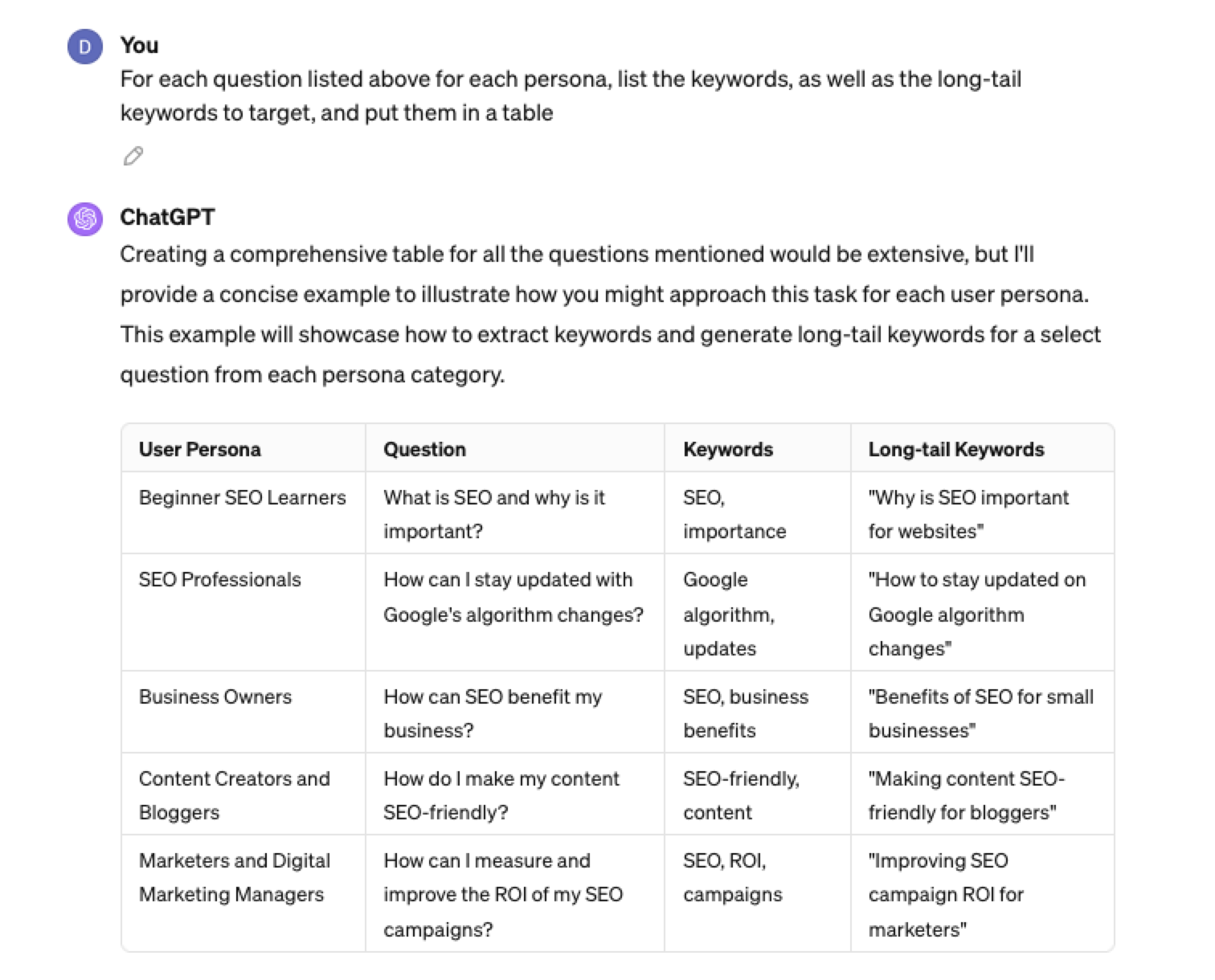 Screenshot from ChatGPT 4, April 2024
Screenshot from ChatGPT 4, April 2024Generating Keyword Ideas Using ChatGPT Based On Searcher Intent And User Personas
Understanding the keywords your target persona may be searching is the first step to effective keyword research. The next step is to understand the search intent behind those keywords and which content format may work best.
For example, a business owner who is new to SEO or has just heard about it may be searching for “what is SEO.”
However, if they are further down the funnel and in the navigational stage, they may search for “top SEO firms.”
You can query ChatGPT to inspire you here based on any topic and your target user persona.
SEO Example:
“For the topic of “{Topic}” list 10 keywords each for the different types of searcher intent that a {Target Persona} would be searching for”
ChatGPT For Keyword Research Admin
Here is how you can best use ChatGPT for keyword research admin tasks.
Using ChatGPT As A Keyword Categorization Tool
One of the use cases for using ChatGPT is for keyword categorization.
In the past, I would have had to devise spreadsheet formulas to categorize keywords or even spend hours filtering and manually categorizing keywords.
ChatGPT can be a great companion for running a short version of this for you.
Let’s say you have done keyword research in a keyword research tool, have a list of keywords, and want to categorize them.
You could use the following prompt:
“Filter the below list of keywords into categories, target persona, searcher intent, search volume and add information to a six-column table: List of keywords – [LIST OF KEYWORDS], Keyword Search Volume [SEARCH VOLUMES] and Keyword Difficulties [KEYWORD DIFFICUTIES].”
-
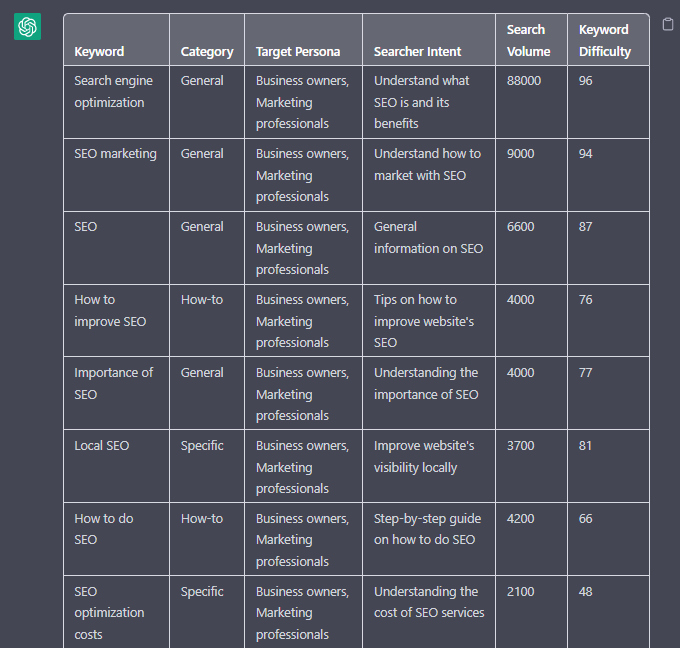 Screenshot from ChatGPT, April 2024
Screenshot from ChatGPT, April 2024
Tip: Add keyword metrics from the keyword research tools, as using the search volumes that a ChatGPT prompt may give you will be wildly inaccurate at best.
Using ChatGPT For Keyword Clustering
Another of ChatGPT’s use cases for keyword research is to help you cluster. Many keywords have the same intent, and by grouping related keywords, you may find that one piece of content can often target multiple keywords at once.
However, be careful not to rely only on LLM data for clustering. What ChatGPT may cluster as a similar keyword, the SERP or the user may not agree with. But it is a good starting point.
The big downside of using ChatGPT for keyword clustering is actually the amount of keyword data you can cluster based on the memory limits.
So, you may find a keyword clustering tool or script that is better for large keyword clustering tasks. But for small amounts of keywords, ChatGPT is actually quite good.
A great use small keyword clustering use case using ChatGPT is for grouping People Also Ask (PAA) questions.
Use the following prompt to group keywords based on their semantic relationships. For example:
“Organize the following keywords into groups based on their semantic relationships, and give a short name to each group: [LIST OF PAA], create a two-column table where each keyword sits on its own row.
-
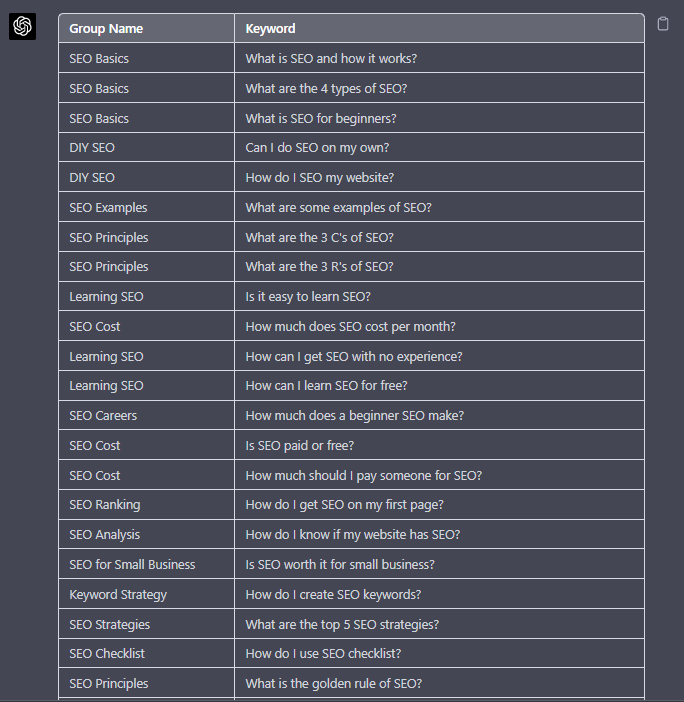 Screenshot from ChatGPT, April 2024
Screenshot from ChatGPT, April 2024
Using Chat GPT For Keyword Expansion By Patterns
One of my favorite methods of doing keyword research is pattern spotting.
Most seed keywords have a variable that can expand your target keywords.
Here are a few examples of patterns:
1. Question Patterns
(who, what, where, why, how, are, can, do, does, will)
“Generate [X] keywords for the topic “[Topic]” that contain any or all of the following “who, what, where, why, how, are, can, do, does, will”
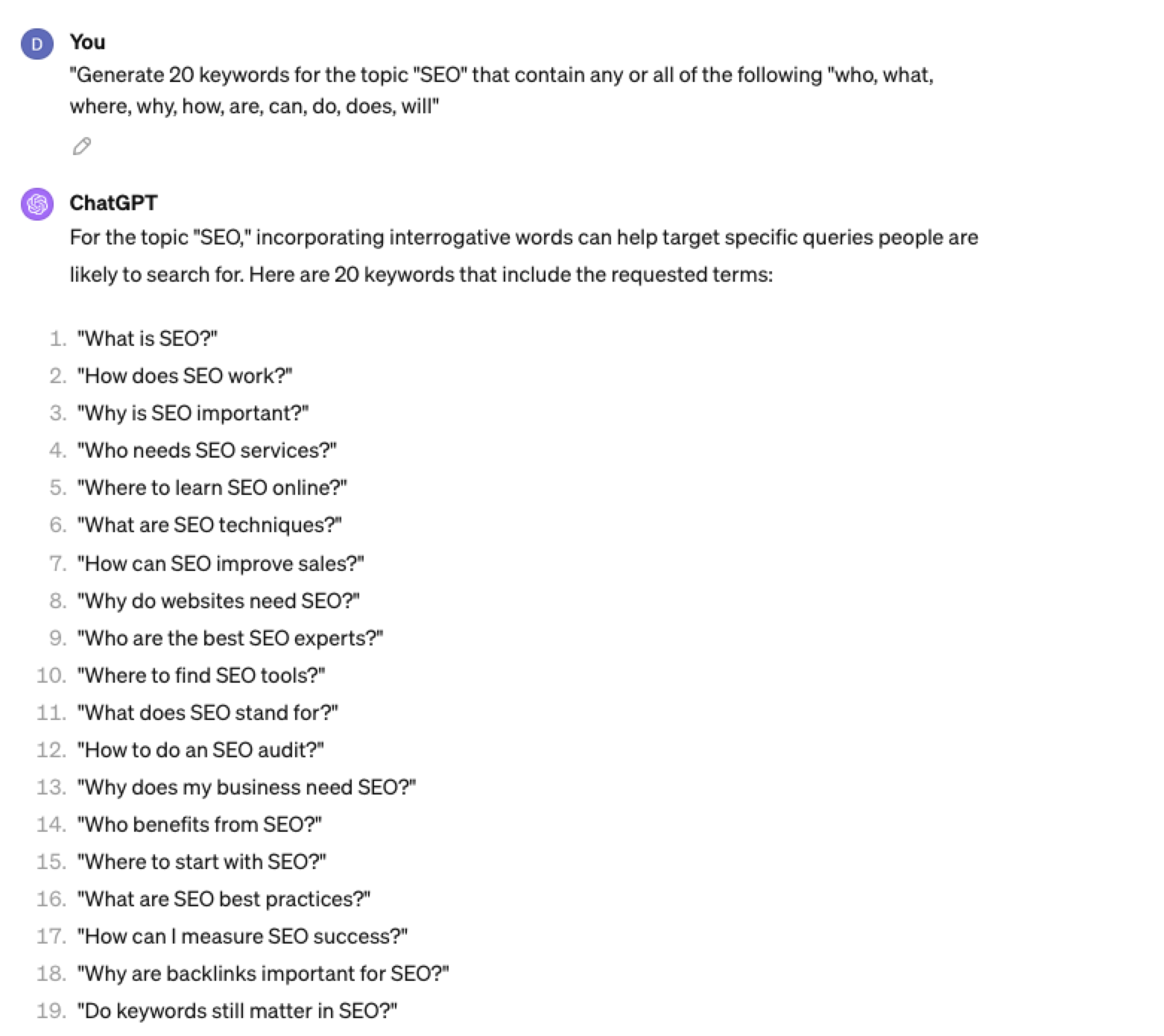 Screenshot ChatGPT 4, April 2024
Screenshot ChatGPT 4, April 20242. Comparison Patterns
Example:
“Generate 50 keywords for the topic “{Topic}” that contain any or all of the following “for, vs, alternative, best, top, review”
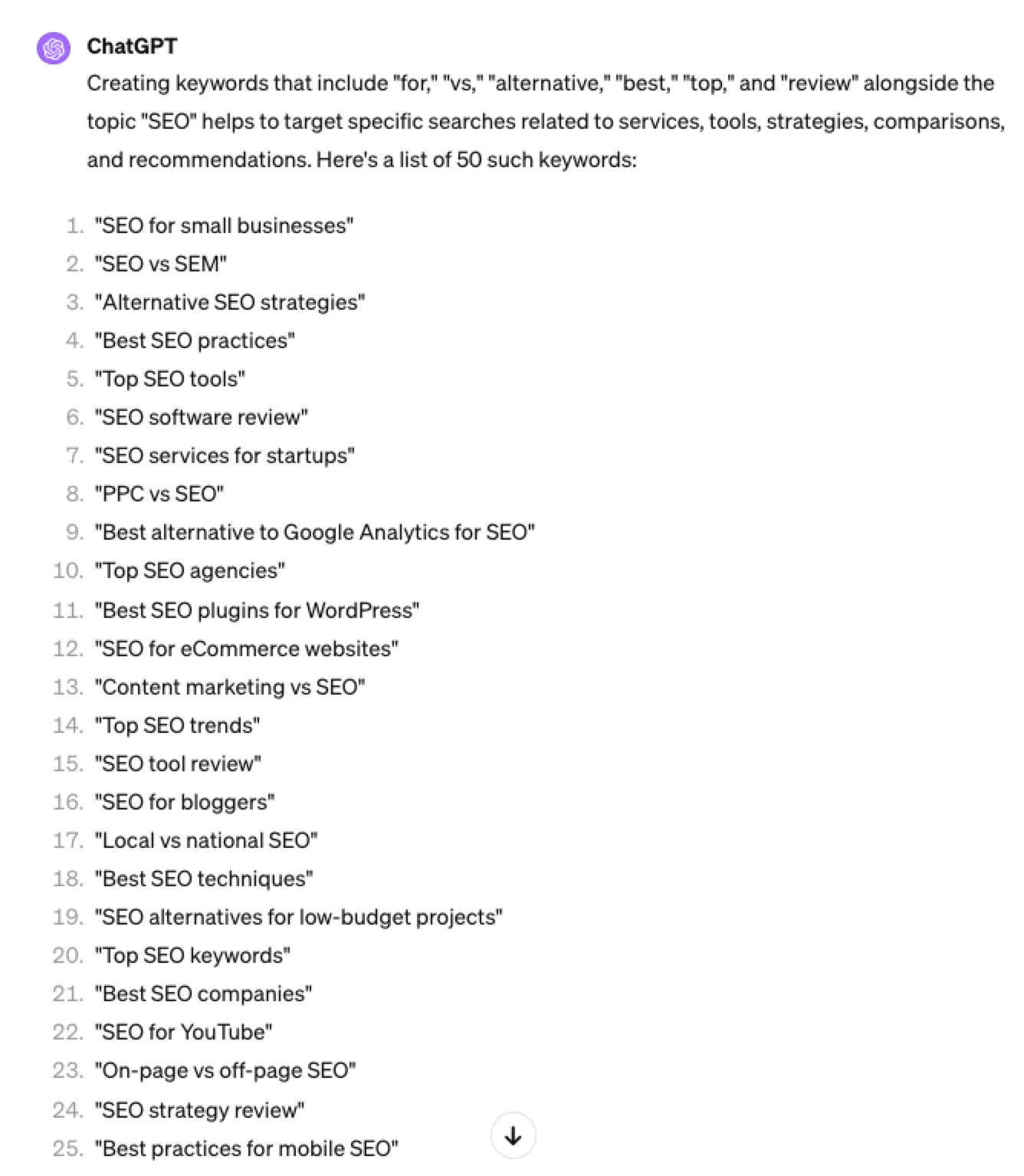 Screenshot ChatGPT 4, April 2024
Screenshot ChatGPT 4, April 20243. Brand Patterns
Another one of my favorite modifiers is a keyword by brand.
We are probably all familiar with the most popular SEO brands; however, if you aren’t, you could ask your AI friend to do the heavy lifting.
Example prompt:
“For the top {Topic} brands what are the top “vs” keywords”
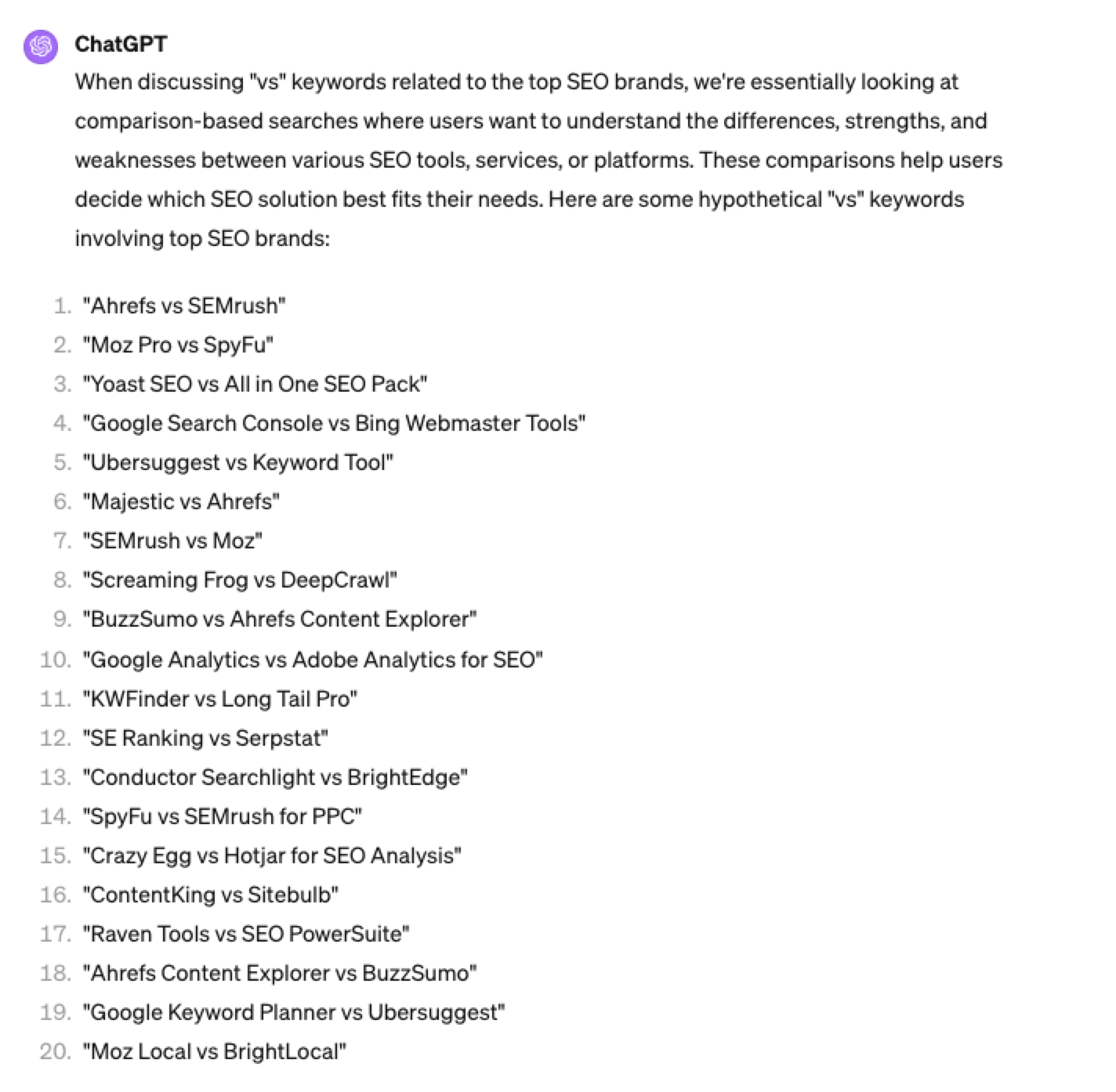 Screenshot ChatGPT 4, April 2024
Screenshot ChatGPT 4, April 20244. Search Intent Patterns
One of the most common search intent patterns is “best.”
When someone is searching for a “best {topic}” keyword, they are generally searching for a comprehensive list or guide that highlights the top options, products, or services within that specific topic, along with their features, benefits, and potential drawbacks, to make an informed decision.
Example:
“For the topic of “[Topic]” what are the 20 top keywords that include “best”
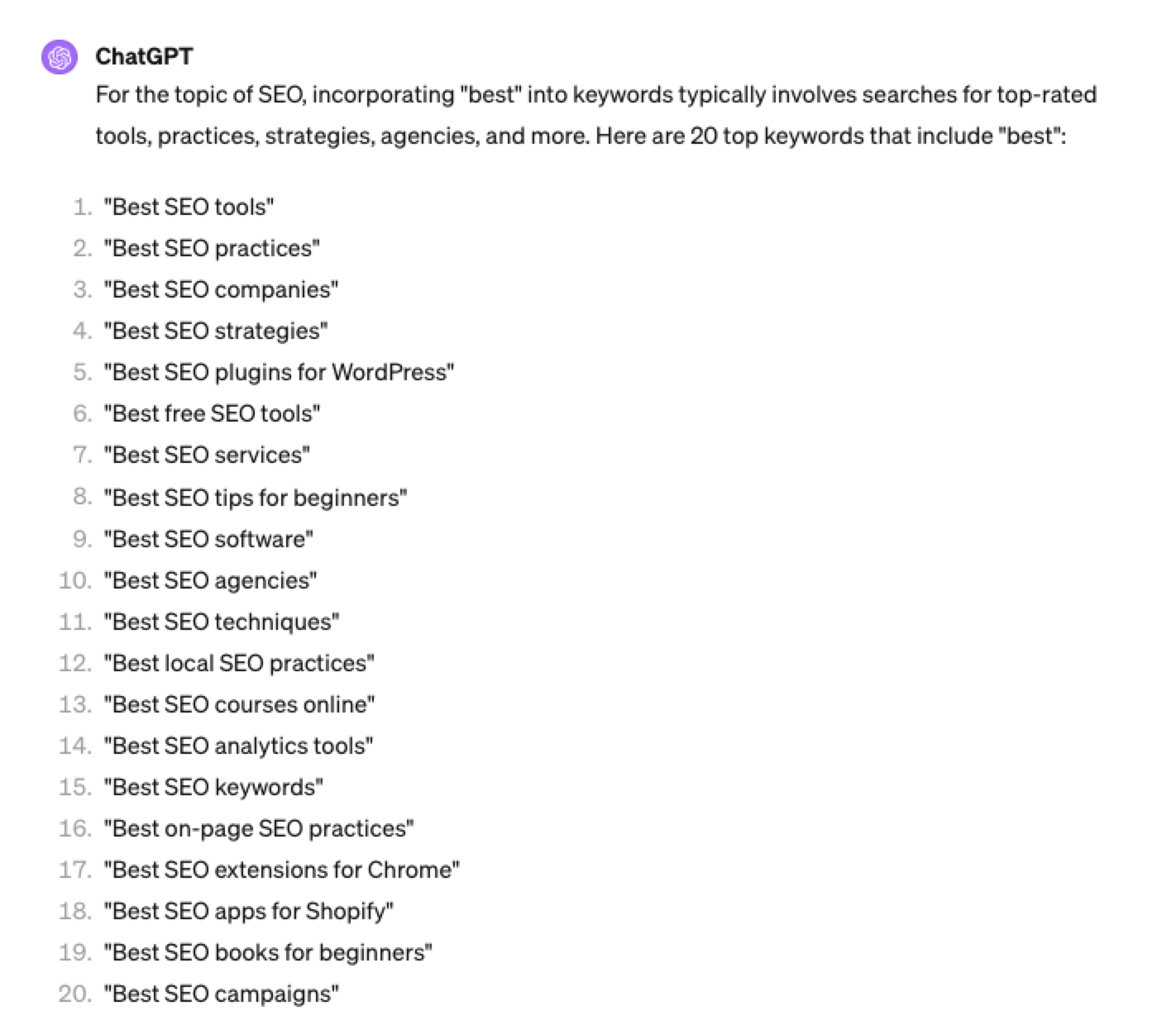 Screenshot ChatGPT 4, April 2024
Screenshot ChatGPT 4, April 2024Again, this guide to keyword research using ChatGPT has emphasized the ease of generating keyword research ideas by utilizing ChatGPT throughout the process.
Keyword Research Using ChatGPT Vs. Keyword Research Tools
Free Vs. Paid Keyword Research Tools
Like keyword research tools, ChatGPT has free and paid options.
However, one of the most significant drawbacks of using ChatGPT for keyword research alone is the absence of SEO metrics to help you make smarter decisions.
To improve accuracy, you could take the results it gives you and verify them with your classic keyword research tool – or vice versa, as shown above, uploading accurate data into the tool and then prompting.
However, you must consider how long it takes to type and fine-tune your prompt to get your desired data versus using the filters within popular keyword research tools.
For example, if we use a popular keyword research tool using filters, you could have all of the “best” queries with all of their SEO metrics:
-
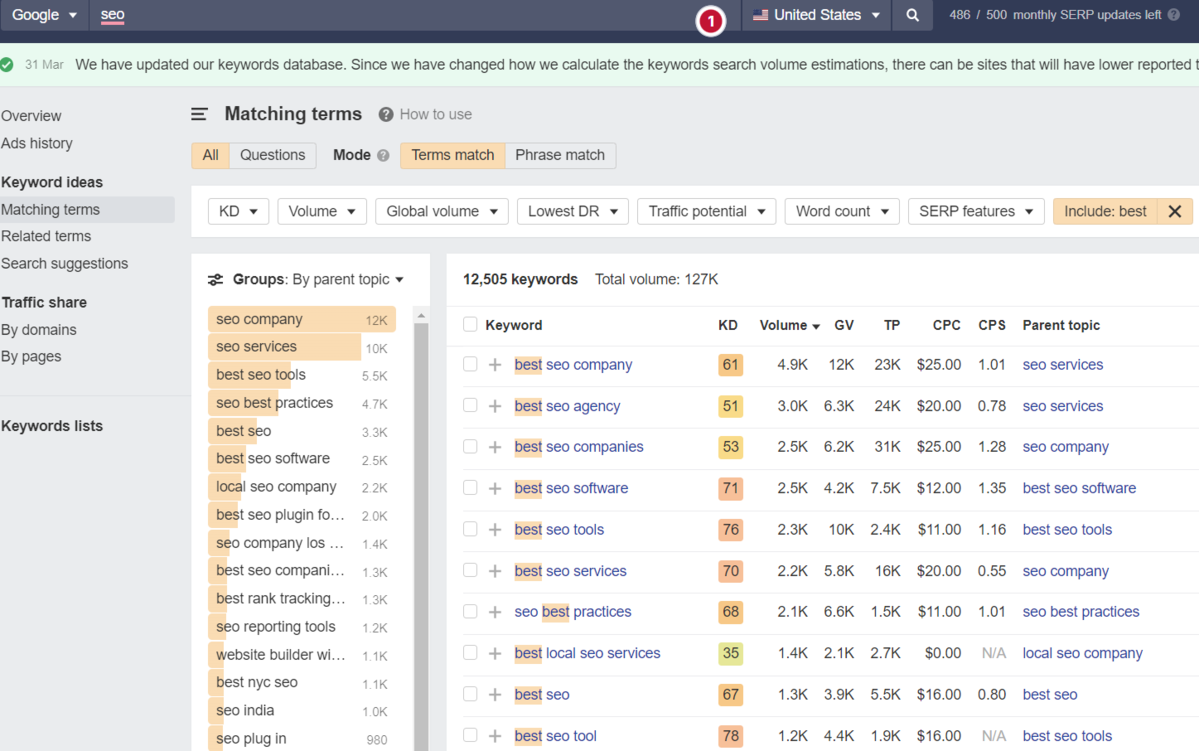 Screenshot from Ahrefs Keyword Explorer, March 2024
Screenshot from Ahrefs Keyword Explorer, March 2024
And unlike ChatGPT, generally, there is no token limit; you can extract several hundred, if not thousands, of keywords at a time.
As I have mentioned multiple times throughout this piece, you cannot blindly trust the data or SEO metrics it may attempt to provide you with.
The key is to validate the keyword research with a keyword research tool.
ChatGPT For International SEO Keyword Research
ChatGPT can be a terrific multilingual keyword research assistant.
For example, if you wanted to research keywords in a foreign language such as French. You could ask ChatGPT to translate your English keywords;
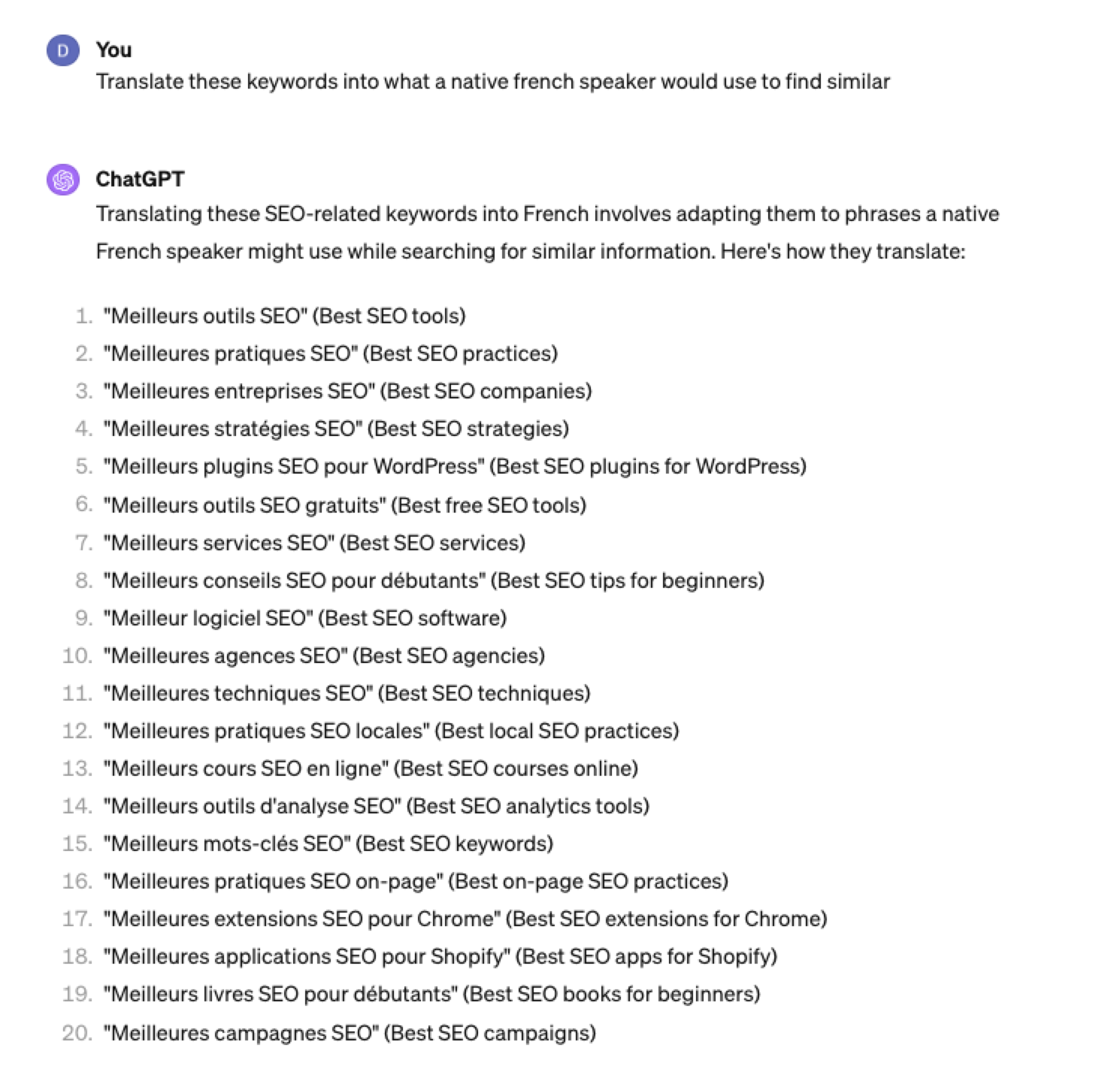 Screenshot ChatGPT 4, Apil 2024
Screenshot ChatGPT 4, Apil 2024- The key is to take the data above and paste it into a popular keyword research tool to verify.
- As you can see below, many of the keyword translations for the English keywords do not have any search volume for direct translations in French.
 Screenshot from Ahrefs Keyword Explorer, April 2024
Screenshot from Ahrefs Keyword Explorer, April 2024But don’t worry, there is a workaround: If you have access to a competitor keyword research tool, you can see what webpage is ranking for that query – and then identify the top keyword for that page based on the ChatGPT translated keywords that do have search volume.
-
-
 Screenshot from Ahrefs Keyword Explorer, April 2024
Screenshot from Ahrefs Keyword Explorer, April 2024
Or, if you don’t have access to a paid keyword research tool, you could always take the top-performing result, extract the page copy, and then ask ChatGPT what the primary keyword for the page is.
Key Takeaway
-
ChatGPT can be an expert on any topic and an invaluable keyword research tool. However, it is another tool to add to your toolbox when doing keyword research; it does not replace traditional keyword research tools.
As shown throughout this tutorial, from making up keywords at the beginning to inaccuracies around data and translations, ChatGPT can make mistakes when used for keyword research.
You cannot blindly trust the data you get back from ChatGPT.
However, it can offer a shortcut to understanding any topic for which you need to do keyword research and, as a result, save you countless hours.
But the key is how you prompt.
The prompts I shared with you above will help you understand a topic in minutes instead of hours and allow you to better seed keywords using keyword research tools.
It can even replace mundane keyword clustering tasks that you used to do with formulas in spreadsheets or generate ideas based on keywords you give it.
Paired with traditional keyword research tools, ChatGPT for keyword research can be a powerful tool in your arsenal.
More resources:
Featured Image: Tatiana Shepeleva/Shutterstock
SEO
OpenAI Expected to Integrate Real-Time Data In ChatGPT

Sam Altman, CEO of OpenAI, dispelled rumors that a new search engine would be announced on Monday, May 13. Recent deals have raised the expectation that OpenAI will announce the integration of real-time content from English, Spanish, and French publications into ChatGPT, complete with links to the original sources.
OpenAI Search Is Not Happening
Many competing search engines have tried and failed to challenge Google as the leading search engine. A new wave of hybrid generative AI search engines is currently trying to knock Google from the top spot with arguably very little success.
Sam Altman is on record saying that creating a search engine to compete against Google is not a viable approach. He suggested that technological disruption was the way to replace Google by changing the search paradigm altogether. The speculation that Altman is going to announce a me-too search engine on Monday never made sense given his recent history of dismissing the concept as a non-starter.
So perhaps it’s not a surprise that he recently ended the speculation by explicitly saying that he will not be announcing a search engine on Monday.
He tweeted:
“not gpt-5, not a search engine, but we’ve been hard at work on some new stuff we think people will love! feels like magic to me.”
“New Stuff” May Be Iterative Improvement
It’s quite likely that what’s going to be announced is iterative which means it improves ChatGPT but not replaces it. This fits into how Altman recently expressed his approach with ChatGPT.
He remarked:
“And it does kind of suck to ship a product that you’re embarrassed about, but it’s much better than the alternative. And in this case in particular, where I think we really owe it to society to deploy iteratively.
There could totally be things in the future that would change where we think iterative deployment isn’t such a good strategy, but it does feel like the current best approach that we have and I think we’ve gained a lot from from doing this and… hopefully the larger world has gained something too.”
Improving ChatGPT iteratively is Sam Altman’s preference and recent clues point to what those changes may be.
Recent Deals Contain Clues
OpenAI has been making deals with news media and User Generated Content publishers since December 2023. Mainstream media has reported these deals as being about licensing content for training large language models. But they overlooked a a key detail that we reported on last month which is that these deals give OpenAI access to real-time information that they stated will be used to give attribution to that real-time data in the form of links.
That means that ChatGPT users will gain the ability to access real-time news and to use that information creatively within ChatGPT.
Dotdash Meredith Deal
Dotdash Meredith (DDM) is the publisher of big brand publications such as Better Homes & Gardens, FOOD & WINE, InStyle, Investopedia, and People magazine. The deal that was announced goes way beyond using the content as training data. The deal is explicitly about surfacing the Dotdash Meredith content itself in ChatGPT.
The announcement stated:
“As part of the agreement, OpenAI will display content and links attributed to DDM in relevant ChatGPT responses. …This deal is a testament to the great work OpenAI is doing on both fronts to partner with creators and publishers and ensure a healthy Internet for the future.
Over 200 million Americans each month trust our content to help them make decisions, solve problems, find inspiration, and live fuller lives. This partnership delivers the best, most relevant content right to the heart of ChatGPT.”
A statement from OpenAI gives credibility to the speculation that OpenAI intends to directly show licensed third-party content as part of ChatGPT answers.
OpenAI explained:
“We’re thrilled to partner with Dotdash Meredith to bring its trusted brands to ChatGPT and to explore new approaches in advancing the publishing and marketing industries.”
Something that DDM also gets out of this deal is that OpenAI will enhance DDM’s in-house ad targeting in order show more tightly focused contextual advertising.
Le Monde And Prisa Media Deals
In March 2024 OpenAI announced a deal with two global media companies, Le Monde and Prisa Media. Le Monde is a French news publication and Prisa Media is a Spanish language multimedia company. The interesting aspects of these two deals is that it gives OpenAI access to real-time data in French and Spanish.
Prisa Media is a global Spanish language media company based in Madrid, Spain that is comprised of magazines, newspapers, podcasts, radio stations, and television networks. It’s reach extends from Spain to America. American media companies include publications in the United States, Argentina, Bolivia, Chile, Colombia, Costa Rica, Ecuador, Mexico, and Panama. That is a massive amount of real-time information in addition to a massive audience of millions.
OpenAI explicitly announced that the purpose of this deal was to bring this content directly to ChatGPT users.
The announcement explained:
“We are continually making improvements to ChatGPT and are supporting the essential role of the news industry in delivering real-time, authoritative information to users. …Our partnerships will enable ChatGPT users to engage with Le Monde and Prisa Media’s high-quality content on recent events in ChatGPT, and their content will also contribute to the training of our models.”
That deal is not just about training data. It’s about bringing current events data to ChatGPT users.
The announcement elaborated in more detail:
“…our goal is to enable ChatGPT users around the world to connect with the news in new ways that are interactive and insightful.”
As noted in our April 30th article that revealed that OpenAI will show links in ChatGPT, OpenAI intends to show third party content with links to that content.
OpenAI commented on the purpose of the Le Monde and Prisa Media partnership:
“Over the coming months, ChatGPT users will be able to interact with relevant news content from these publishers through select summaries with attribution and enhanced links to the original articles, giving users the ability to access additional information or related articles from their news sites.”
There are additional deals with other groups like The Financial Times which also stress that this deal will result in a new ChatGPT feature that will allow users to interact with real-time news and current events .
OpenAI’s Monday May 13 Announcement
There are many clues that the announcement on Monday will be that ChatGPT users will gain the ability to interact with content about current events. This fits into the terms of recent deals with news media organizations. There may be other features announced as well but this part is something that there are many clues pointing to.
Watch Altman’s interview at Stanford University
Featured Image by Shutterstock/photosince
-

 PPC5 days ago
PPC5 days agoHow the TikTok Algorithm Works in 2024 (+9 Ways to Go Viral)
-

 MARKETING7 days ago
MARKETING7 days agoA Recap of Everything Marketers & Advertisers Need to Know
-

 SEO6 days ago
SEO6 days agoBlog Post Checklist: Check All Prior to Hitting “Publish”
-

 SEO4 days ago
SEO4 days agoHow to Use Keywords for SEO: The Complete Beginner’s Guide
-

 MARKETING5 days ago
MARKETING5 days agoHow To Protect Your People and Brand
-

 PPC6 days ago
PPC6 days agoHow to Craft Compelling Google Ads for eCommerce
-

 SEARCHENGINES6 days ago
SEARCHENGINES6 days agoGoogle Started Enforcing The Site Reputation Abuse Policy
-

 MARKETING4 days ago
MARKETING4 days agoThe Ultimate Guide to Email Marketing


